















XP Music Futures was established to accelerate the growth of MENA’s music industry – launching with an annual 3- day music conference in Riyadh in 2021.
With workshops, panel discussions, networking opportunities, and separate Day and Nite tailored programming – we, XP, are expanding pathways for music industry professionals of all backgrounds.
From industry professionals and policymakers to Saudi youth, we’re all coming together to celebrate music. Inspired by the root of XP Music Futures - the people involved from the ground up - XP has created a powerful community that not only celebrates the conference, but also life after XP, from inclusive workshops and events to supportive initiatives. Simply put, this holistic approach celebrates the music community for the impactful, and multifaceted ecosystem that it is.
Some of this year’s objectives were to help equalize the gender balance, ensuring that women were not only brought to the table, but also afforded the comfort to share, exchange and learn. Another ambitious goal we reached was to call upon the help of our friends through partnerships. Our partners local, regional and international - helped us elevate our conference experience and overall programming with their various perspectives and resources.
We aim to bring the region together by building the infrastructure for music in the Middle East, creating a space with open borders for creative and cultural exchanges, for a sustainable and equitable music future for all.
XP Director, Nada Alhelabi

This report delves into the prominent themes of XP Music Futures, categorized under our four pillars:
Talent, Scene, Impact, and Innovation. The event successfully brought together both regional and global key industry leaders and, through various activities like panels, discussions, workshops, collaborations, and performances, this year’s editionclearly emphasized Saudi Arabia as a key hub for arts and music in the region.
XP Music Future is built on four pillars that tackle the nuances of the MENA region’s music industry as it grows and expands. The XP pillars are the cornerstones of our strategic thinking - helping us map out our programming, initiatives and ultimately, the future of music.
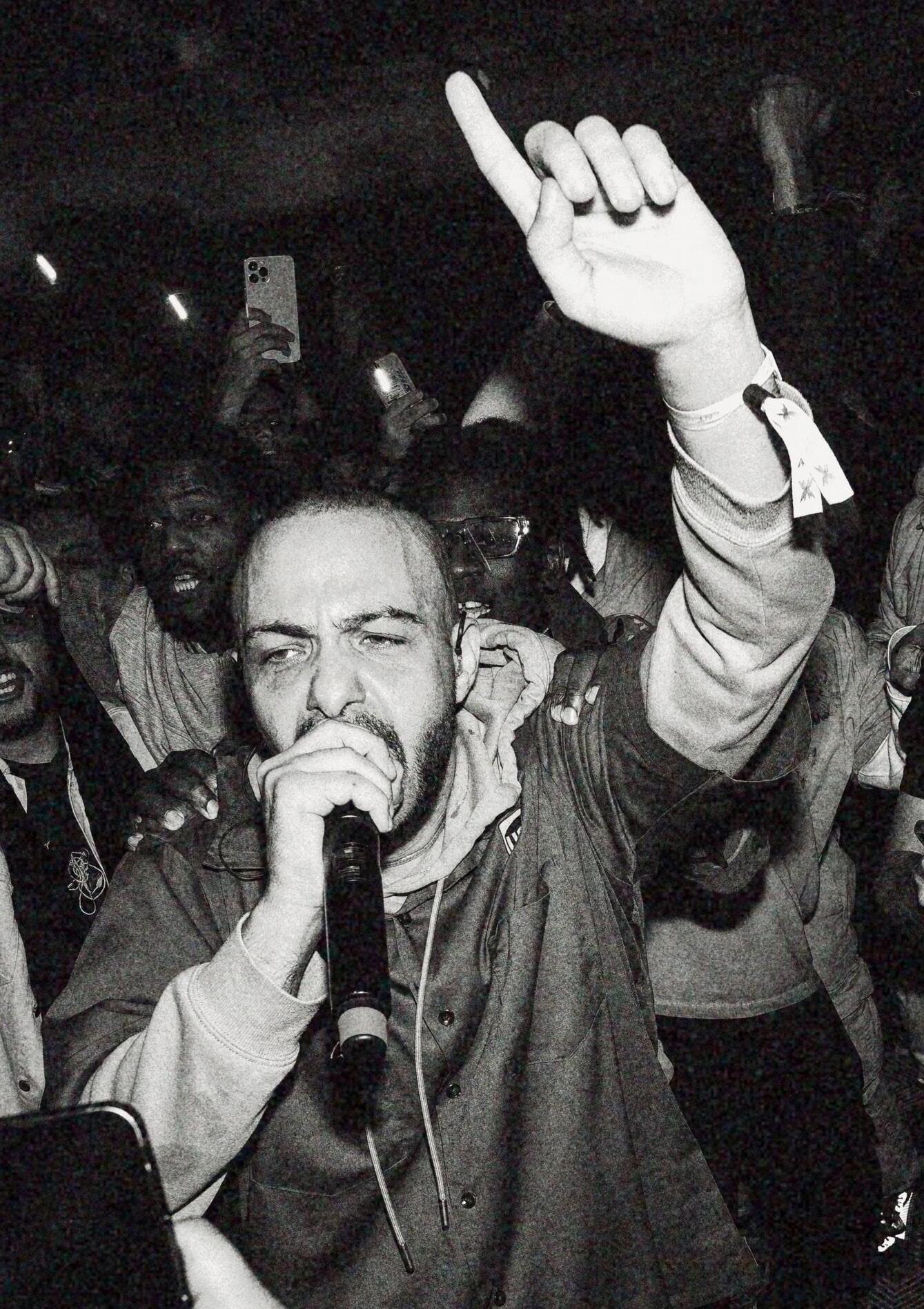

Talent: Talent is the fuel of our mission. We empower up-and-coming artists, producers, label owners, grassroots venues, and promoters to turn their passion into selfsustaining businesses.
Scene: The scene is the beating heart of our industry. We’re focused on growing our audiences organically to create a dynamic music economy. We explore the importance of community-driven spaces, from underground parties to international concerts.
Impact: Our Impact pillar focuses on empowering and enabling our scene through the application of knowledge and insight. This helps us gain a more profound understanding of the music ecosystem, highlighting sustainability, equality, and social equity as its backbone.
Innovation: Tapping into the latest developments in the tech space, showcasing the transformation AI brings to the music industry. We’re constantly tapping into the insights of tech specialists to better understand the future of music and tech.
This report will bring together the overall impact and recommendations from this year’s insights, offering a well-rounded view of the potential path for the upcoming year through the thematic exploration of this year’s program.





Music Commission
JAX
YouTube
Spotify Anghami
TikTok (attending company)
Billboard
Berklee Abu Dhabi
Sony Music
Warner Music Merwas
Sakura Wellness
L-Acoustics
Sangha Hub
Massive Music
Dolby
SOWT
SPAARD/Pangaia
DJ Corner
Pepsi / Orenda
Tribe
Saudi Grand Prix
AEON


As we get into this report, we just want to give a big shout-out and sincere thanks to our partners who helped make XP Music Futures’23 possible.









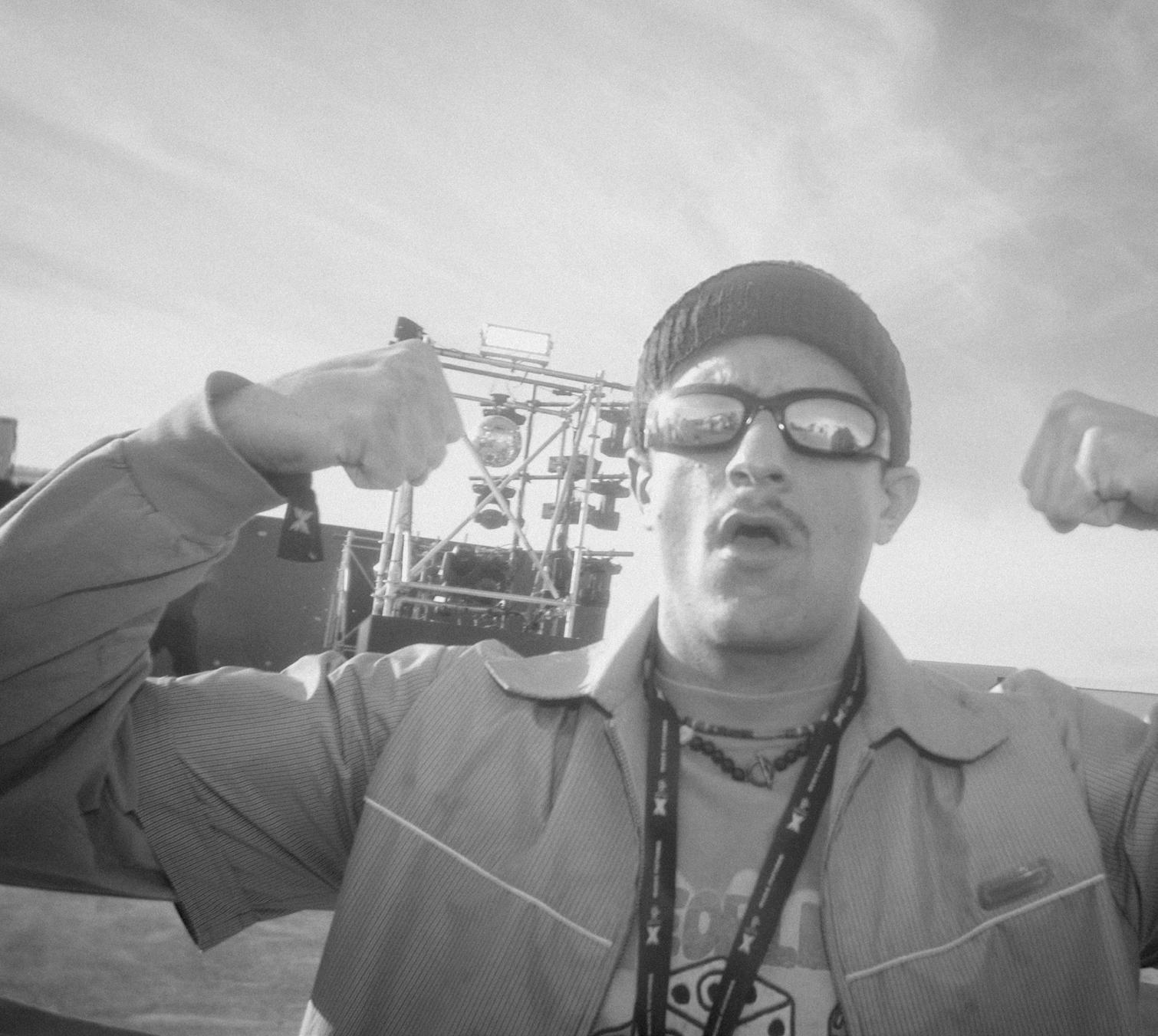
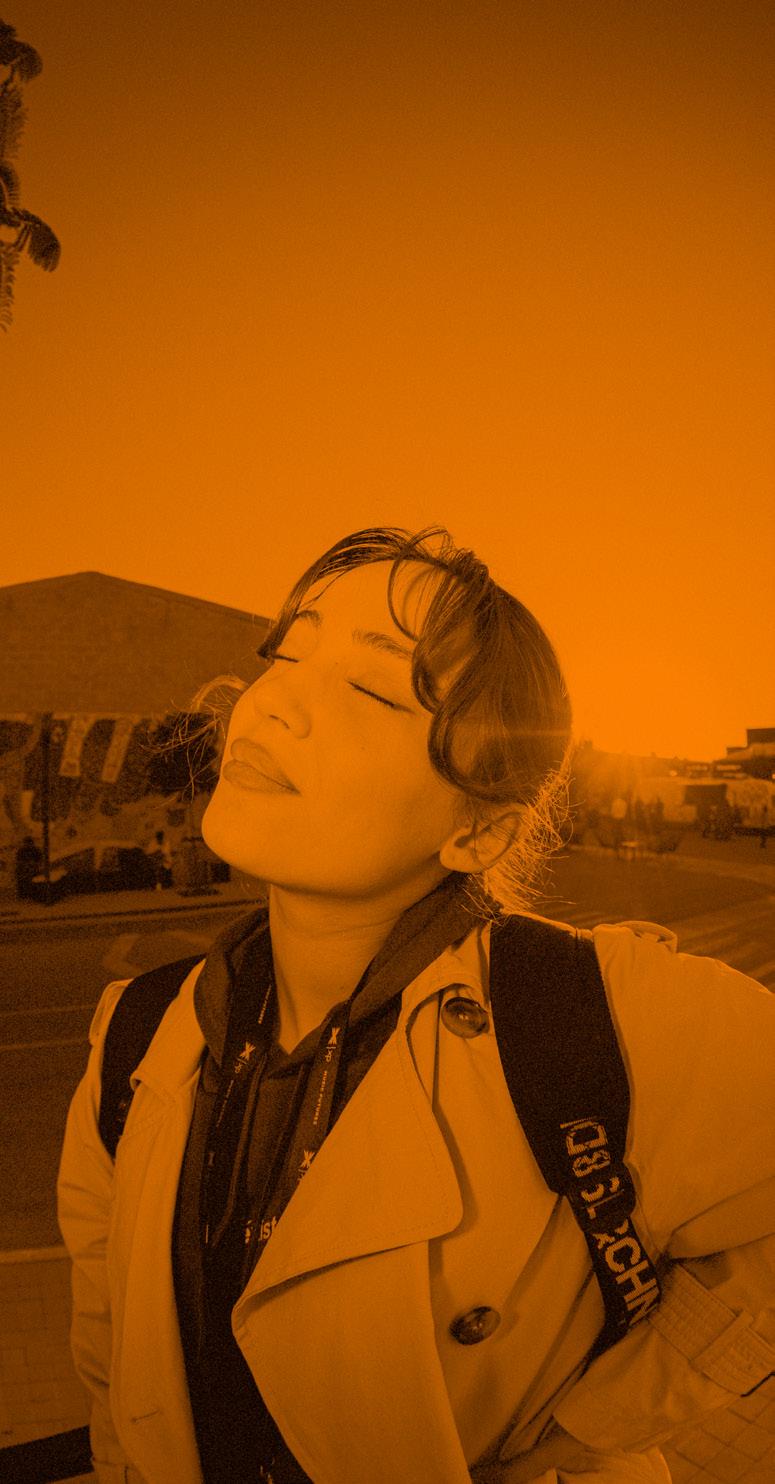
7 Executive Summary
Every year, XP provides artists with a platform, know-how, gear, and a community to help them grow their talents, make a lasting impact, and foster successful careers - whether it’s close to home or around the world. To consistently continue our journey, we called upon the help of our friends. Together, with our partners, we’ve broadened our circle, bringing in talents - both regional and international - who can nurture a positive ecosystem. This year, we teamed up with 22 different partners – from products and media to record labels, agencies, and artists worldwide.
XP Day 2023 in Numbers
The XP Music Futures 2023 team worked hard to put together a solid program, really digging into the local music and cultural scene. Their ongoing commitment to improving our programming shows in this year’s solid stats – the event was a big success for everyone who came, spoke, or performed.
At XP Music Futures, we aim to tackle the various facets of our music ecosystem through our diverse roster of initiatives, all focusing on music industry niches. Our previous editions featured XPERFORM, XChange, Storm Shaker, Hearful, and XP Air. This year, we introduced three new initiatives: Hunna, Sound Futures, and Artist Management Bootcamp, bringing our total initiatives to 8. Whether connecting women in the industry through Hunna, incubating innovative music startups via Sound Futures, or providing tools for regional managers to nurture artist growth with Artist Management Bootcamp, our goal is to make viable, and diverse, career pathways in music.


Sessions

Workshops Panels
Keynote speeches

Wellness Session

Fireside Chats
Networking Sessions
15 06 11 14 04 08
Fishbowls

Mixers
Kids Klub Activities
Music Comission Sessions









During the day, the talks took place in 11 different venues, and we had 296 speakers from 54 countries, with 11 representatives from the government sharing their views. We ramped up our Arabic sessions with 11 workshops and 6 local stars to connect with our regional crowd. In terms of consistently bettering our gender balance, we hit a cool split of 48.25% females to 51.75% males in XP Music Futures 2023.
Gender breakdown of speakers: 138 females (46%), 158 males (54%)
Geographical representation: 52 local to Riyadh (18%), 121 international (41%), 74 regional (25%)
XP Music Futures, in collaboration with YouTube, has partnered to support Saudi Arabia’s music industry and regional artists. YouTube sponsors the XPERFORM initiative, a music competition focused on discovering and nurturing talent in the area, including a boot camp to help artists expand their YouTube audience. The vocal competition, in partnership with MDLBEAST Records, offers contestants the opportunity to advance their careers.
Additionally, XP Music Futures is collaborating with SAUDI ARABIAN GRAND PRIX, providing winners the chance to perform at the FORMULA
1 STC SAUDI ARABIAN GP race weekend in Jeddah in March 2024 through XPERFORM. Auditions were held at the Music Hub in Riyadh, marking a new standard for music competitions in the Middle East and North Africa. This initiative reflects XP Music Futures dedication to supporting emerging talent and aligns with the mission of inspiring and empowering youth in the region.

Announcements

Spotify and Femme Fest joined forces for an exciting collaboration during XP Music Futures 2023, featuring a lineup of exceptional artists performing under the theme “IF THE MOON COULD TALK.” This partnership highlights Spotify and Femme Fest’s shared commitment to empowering women in the music industry, and the collaboration with XP Music Futures seeks to build on the success of the platform and create space for women in the music industry to express their ideas and showcase their art.
The collaboration is part of EQUAL Arabia, Spotify’s regional initiative focused on advancing gender equity in music. EQUAL Arabia provides a platform for women musicians and creators, highlighting the importance of supporting women artists to create more opportunities in the industry. Femme Fest, a pioneering creative agency and music festival, aims to provide a safe and supportive platform for female-identifying artists.
HUNNA is one of XP’s new initiatives which focuses on supporting women in the music business, particularly in the Middle East and North Africa. The initiative aims to create a supportive network for women in music, offering mentorship programs across Music Business, Music Production, Music Management, and Artistry. The three-month mentorship
includes virtual listening circles, fostering community engagement and discussions on equity in the music industry. XP brought mentors and mentees together during XP Music Futures 2023, allowing mentees to showcase their progress in person and strengthen the bonds within the program.




In 2023, XP Music Futures featured a variety of 11 venues, each carefully chosen to host talks, panels, networking sessions, and live performances. The diverse venues were:
This space functioned as an outlet for all creatives and talent in the industry. With a holistic program that encompassed various genres and art-styles, Theater invited everyone to exchange their skills and build community and connections among each other.
This venue hosted large-scale discussions with a wide range of topics that catered to diverse audiences. Our goals for Arena were to bring together individuals from different areas of the music industry and connect them through mutually-inclusive matters and developments regionally and globally, better-equipping them in navigating and understanding the industry.
The fishbowl was its own unique venue that held some of the most impactful panels and one of our favorite session formats – it blurred the lines between the panelists and the audiences. With the seats set up in a circular format, everyone around the room is encouraged to share their ideas –candidly & casually.
As part of XP’s continual strategic partnership with the Saudi Music Commission at XP Music Conference, we set up a venue to include talks and panels in line with their mission to ensure that the development of the local music ecosystem remains equitable, and anchored in the promotion of Saudi talent - with strong programming, education, talent incubation and policy development. Together, we aim to elevate and fortify the future of music within the Kingdom.



In the Mixers and Networking Forums like IHG Meets, attendees received the rare opportunity of meeting industry leaders and music experts from all over the world. They got the chance to connect with the founders of their favorite labels and collectives, the producers of their favorite records, the bookers and curators of their beloved festivals, and everyone in-between. They got the entire global music ecosystem in the palm of their hands.
In 2023, XP introduced the Little Maestro’s Kids Klub, a special space for the youth to gather, learn, and explore their interest in music and the arts. This dedicated and safe environment offers opportunities for skill development, collaboration, and engagement with regional rising stars like Mishaal Tamer and DJ Michelle. From learning to play the Oud to fostering creativity, the Kids Klub is designed to nurture and grow the young minds of XP.
These main venues served as vibrant hubs where creative ideas, discussions, and an exchange of cultures could happen freely and constantly. Each location was carefully selected to offer the perfect atmosphere to tackle the various facets of the music and arts scene.

“The Healing Oasis” is a sensory experience that combines the healing power of nature, music, and art to offer a space of respite for attendees. The space is designed as an immersive forest with lush trees and rich plants which give a calming atmosphere.
As well as an interactive art installation that uses light, sound, and projection to create a multisensory experience. The installation responds to the natural surroundings and the music being played at the conference.


Workshop 1, Workshop 2 & Studio Workshop 3
XP Music Futures 2023 was proud to present an incredible array of workshops for 2023. With our focus last year moving towards practical music industry experience, we worked hard to create a plethora of accessible workshops for our XP community. From digital production to creating your own bespoke merchandise, empowering songwriting masterclasses to rejuvenating wellness experiences - we had it all covered.
Another new addition in 2023, the Demo Lab brought together our music products, as well as friends in innovation, to showcase their latest products, their features and to demonstrate how to utilize them in your music career. This interactive space gave room for attendees to try out new technologies, or explore new brands.

Our mission is driven by the talent we support. We strive to empower emerging artists, producers, label owners, grassroots venues, and promoters, helping them transform their passion into sustainable businesses.

The Music Commission aims to champion the music sector in Saudi Arabia, fostering it as an art, a culture, a science, and a means of entertainment. This will be achieved through the promotion of five pillars: Music Education, Music Production, Music Shows and Performances, Advocacy, and Licensing. It envisions a future where
XP Music Futures is thrilled to continue the ongoing strategic collaboration with the Saudi Music Commission. It plays a crucial role in fostering an inclusive and thriving local music ecosystem, emphasizing the promotion of Saudi talent through robust programming, educational initiatives, talent incubation, and policy development.
our Nation will be known by its sound, where the power of music inspires confidence and trust, binding our people together, proud of our heritage and faithful in our future, and where our voice will resonate in the world as a bridge across cultures.
Together, the Saudi Music Commission and XP Music Futures had carefully crafted an extensive three-day program for the conference. This collaborative effort is dedicated to advancing and strengthening the future of music within the Kingdom, ensuring a vibrant and sustainable musical landscape.

This nuanced and culturally sensitive approach adds depth and richness to artistic expression, creating a dynamic blend of tradition and innovation.
For an artist, achieving success in music extends beyond incorporating cultural sounds;
it involves properly navigating and leveraging cultural nuances and practices inherent in music. This includes a deep awareness of the broader cultural circumstances that either foster or hinder specific artistic development.
In this context, the focus is not just about remaining authentic to cultural sounds, but it includes embracing a form of cultural innovation unique to the artist’s creative approach. It’s not just using cultural elements superficially, but deeply understanding and integrating them in a way that contributes to the evolution and innovation of the regional musical landscape.
In an effort to preserve traditional Saudi musical heritage,
The Saudi Turug Initiative by the Music Commission was launched. The initiative asserts that the best way to preserve ancient musical knowledge is to teach it, and explores how one could benefit from our regional music heritageacknowledging that the organic transmission and preservation of music heritage is a cultural practice to learn from on its own. Recognizing the sophisticated musical theories and concepts that are organically applied across all 13 regions of Saudi, as well as cultural significance of music heritage, there is a potential of enriching modern music expression and production through the application of traditional knowledge.
Heritage and Tradition in a Modern Music Industry (Hosted by the Saudi Music Commission)

The initiative highlights the importance of considering local music heritage while developing the Saudi music industry to avoid alienating its culture and population, in addition to making use of historical music knowledge. With this foundation, the integration of regional
Venue: The Saudi Music Commission Space
music heritage into the broader music industry is valuable as it not only serves as a means of preserving history, but also as a catalyst for future innovation. The effort is not to only celebrate the past, but to develop the future of the music industry.
Speakers: Ahmed Karkanawi, Haya Alhozab

In the evolving music landscape, artists face the challenge of finding balance and understanding various entry points in the digital era. In Africa, communication is often carried out through playlists, blog emails, and social media, providing opportunities even for artists with limited resources.
Music in Africa has the potential to transcend borders, fostering harmony and changing perceptions. It’s crucial for African creators to assert their global presence, shifting from ‘Africa rising’ to ‘Africa claiming.’ Embracing the uniqueness of African sounds and promoting collaboration is essential, as it involves acknowledging differences, working together, and leveraging commonalities in messages.
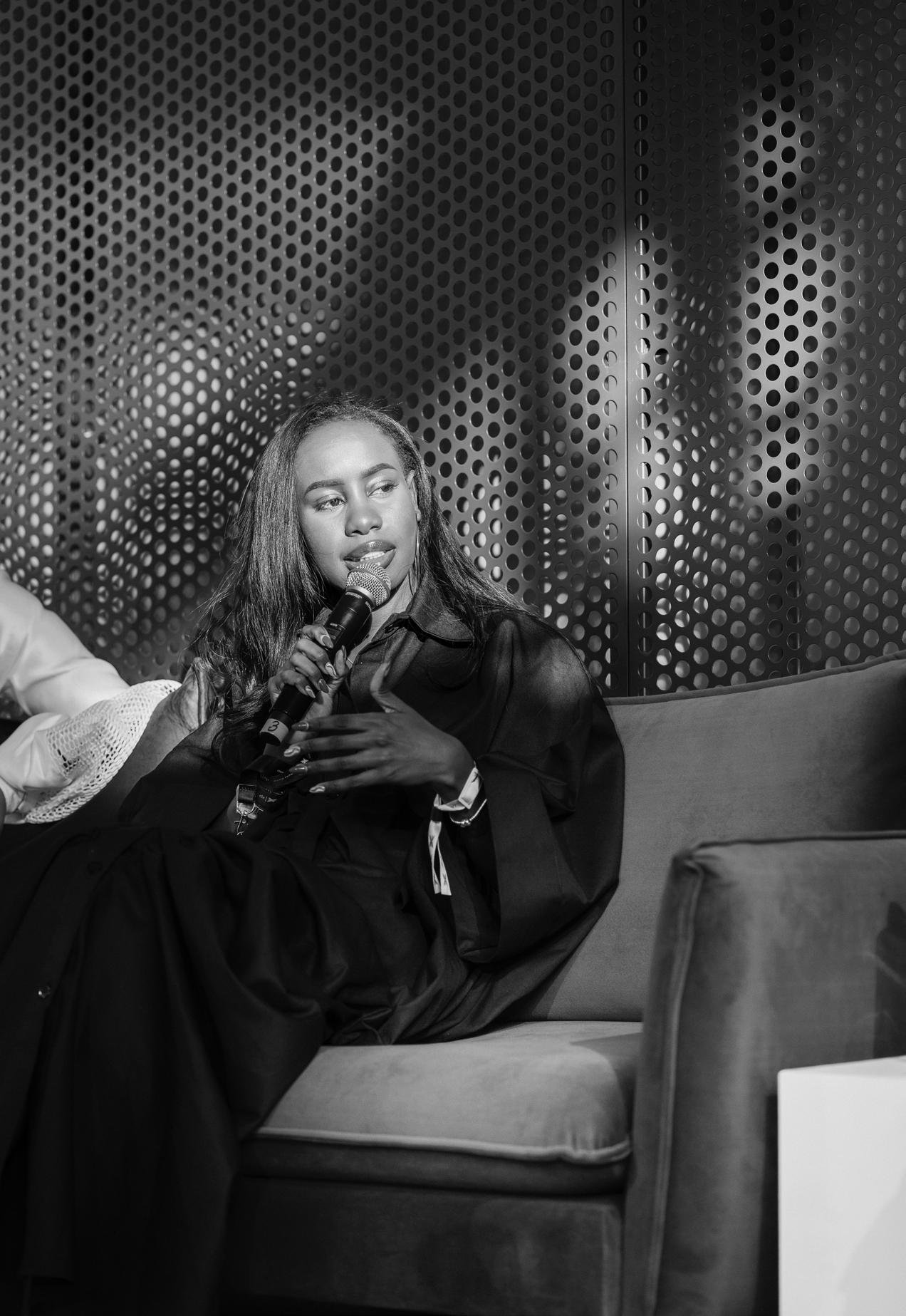
Venue Theater
Speakers



The K-pop industry operates as a well-organized system with support from the government and various institutions. Unlike the independent music scene, K-pop follows a structured approach involving a careful incubation period, detailed planning, and strategic partnerships to reach diverse markets and audiences. In contrast, the indie scene thrives on the values of freedom and individuality. K-pop is a genre that is heavily dependent on the connection between the artist and their fans; taking on the similar collective mindset of the culture, it’s not just about the music.
The appeal of K-pop extends far beyond its music, covering the entire culture, including performers’ mannerisms, fashion, aesthetics, and flawless sound production. The success of K-pop is dependent on its dedicated fanbase, culture and the close connections artists maintain with their fans, which makes the genre extremely popular on a global scale.



The film series Dancefloors: SWANA aims to showcase the musical landscape of the region, focusing on portraying its positive aspects and diverse musical culture. Overcoming the lack of government infrastructure for creatives can be achieved by regional collaborations, showcasing talent from neighboring countries, and breaking down barriers through shared musical experiences.
The series aims to send the message that the initial stages of pursuing one’s dreams are driven by passion, not a concrete and detailed plan. It’s a day-by-day process, building life around the passion for music, adapting to challenges, and learning through the journey.





The revival of Arabic microtones involves acknowledging lost knowledge and bringing it back to life through archival exploration and actively listening and training our ears. Oral tradition, mentorship, and auditory learning were crucial before standardization, emphasizing the importance of ear training in musical education.
Cultural expression through music is challenged by globalization and standardization, requiring conscious efforts to preserve and educate about microtonal traditions. Harmonizing maqamat poses challenges due to their flexibility and unique structures. Non-intrusive harmony techniques and an understanding of microtonal nuances are essential for preserving the Arabic musical identity.
Instruments like the qanan illustrate historical shifts in microtonal systems, highlighting regional variations and the impact of standardization efforts. Customization and experimentation, such as using fretless guitars, offer avenues for personal expression within traditional frameworks.



Venue: Theater Speakers:
House music was born in Detroit against a backdrop of an economic crisis, drug issues, and crime.
The Music Institute significantly contributed to Detroit’s music scene development, providing a platform for the younger generation to hone their skills. It also paved the way for the genre globally.
The success of the Music Institute was largely organic, driven by the private membership model, creating a sense of exclusivity and community. Building a community, respecting the craft, and learning from those who came before you while honing your unique style are vital in establishing a budding music scene.


Venue: Arena
Speakers:
Abyusif, Moe Hamzeh, Freek, Malikah
Arabic Hip Hop faced an uphill battle when it first evolved out of Beirut and Ramallah in the early 2000s. It consistently grew in popularity until it overtook mainstream music genres in the region today. Its rise wouldn’t have been possible without social media and the internet, which connected desolate scenes in the region with each other and with the wider audience, paving the way for the ascent
of Hip Hop as a popular music genre. Hip Hop artists and rappers in the region should consistently work to stay true to their core values and ideals that first got them into rap, and should strive to collaborate with others and set their egos aside to allow the scene to continuously grow and evolve.



The culturally diverse and rapidly evolving market of Sub-Saharan Africa to the Middle East and North Africa represents huge potential for some of the world’s most vibrant regions. Despite unique challenges faced by each city, the Middle East is currently undergoing a transformative phase marked by increased collaboration and positive shifts in the music scene. The pivotal role of preserving a robust musical identity through this transformation is crucial for the region’s rise within the industry.


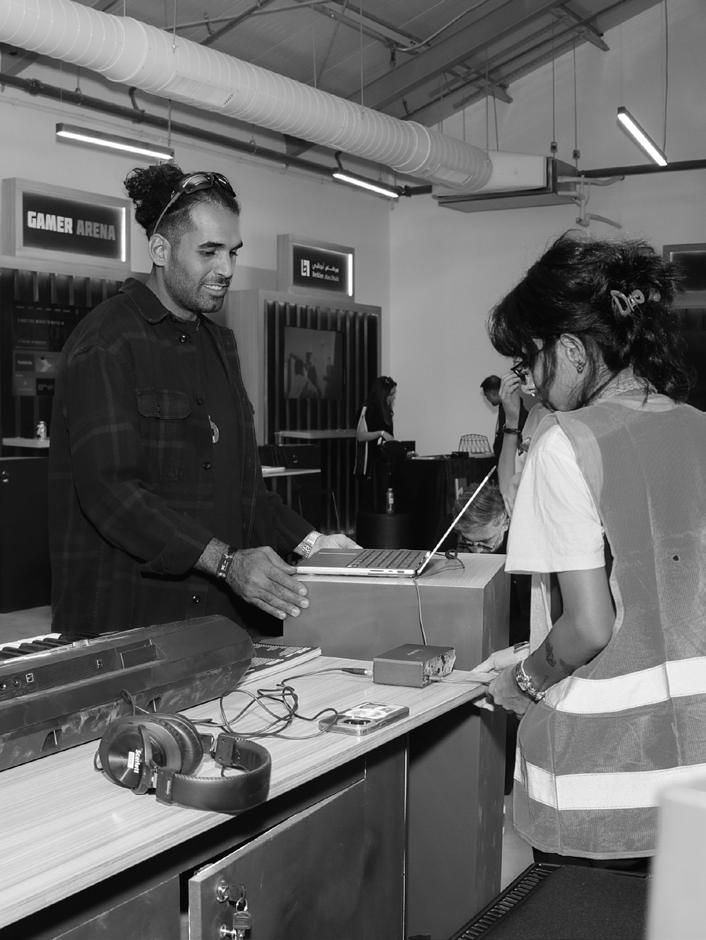


Similar to Latin America, there’s a need to create a unified sound that resonates across the diverse cultures within the MENA region. The unified sound could reel in diaspora communities, which could potentially propel local music onto the global stage. There needs to be more robust intellectual property rights in the MENA music market in order to foster the market’s growth and sustain the music industry’s evolution, as well as making use of AI in music production and marketing which can be positive so long as we continue to respect human creativity while leveraging technology for innovation.
Speakers:
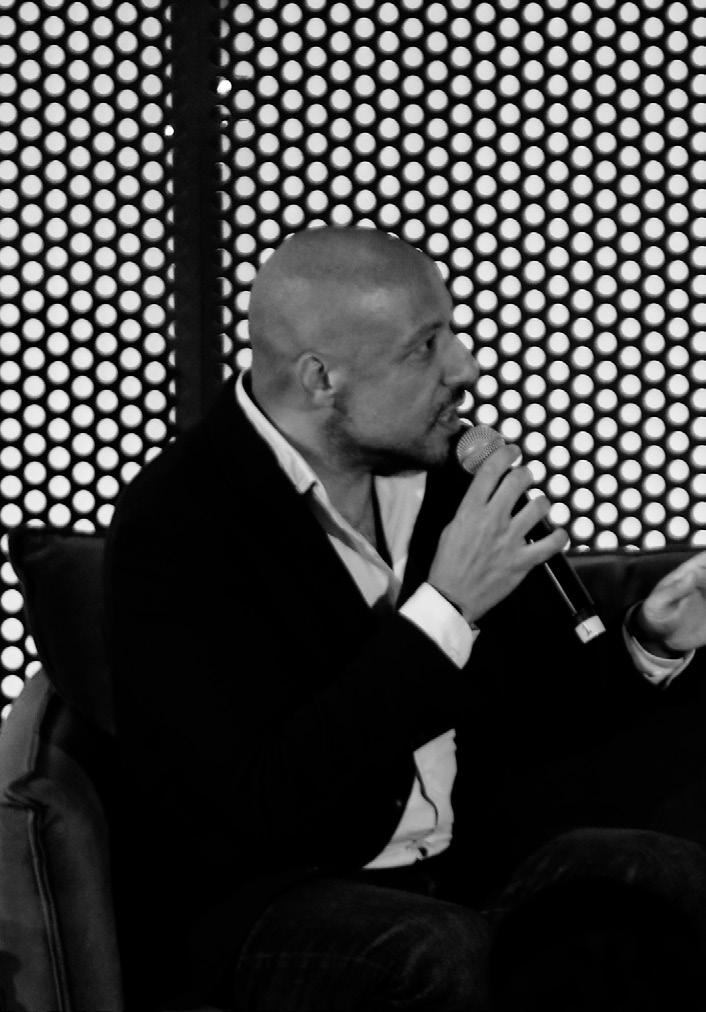

If you are multi-talented, working by elimination can help you decide on which career path to follow. It’s vital for musicians to develop their own unique sound print and artistic identity, and never compromise it for the sake of market trends. It is what
sets artists apart, and contributes to longevity. Bigger companies or labels can still benefit household name artists by allowing them access to larger teams, partners, and tools that they might not otherwise be able to utilize in order to enhance their
album performances. The evolution of music production and distribution means a transformation in strategies, platforms, the role of the artist, and the enormous impact data analysis has on postrelease evaluations and enhancement.

Venue: IHG Meets
Speakers: Shermine Sawalha (Malahi Entertainment, Malakat Records, Ctrllab, Esc), Timmy Mowafi (SceneNoise & MO4 Network), Mayssa Karaa (Berklee Abu Dhabi), Heba Zaidan (MDLBEAST), Gael Hedding (Berklee Abu Dhabi)
XChange is a series of workshops aimed at finding common pain points in the regional music industry and working to address them through relevant stakeholders in the community. Across all cities, the lack of venues is detrimental to the creation of ties within the community and artistic growth.
Education is a key factor in empowering artists, managers, agents, and all stakeholders involved in the industry. Despite the challenges particular to each city, the Middle East is experiencing a transformative moment, with increased collaboration and positive changes in the music scene. Maintaining a strong sense of identity in the music alongside the transformation will play a significant role in the rise of the region in the industry.



Venue: The Saudi Music Commision Space
Speakers: Mohammed Bouzganda (Saudi Music Hub) and Saddam Kamoon (Saudi Music Hub)
The qanan and oud are ancient MENA instruments that have historically been exemplars of the region’s sound. These instruments underwent various phases of development before reaching the current forms we know them in. Their developments are products of historical intercultural exchange and music education - highlighting the profound influence of philosophy, art and knowledge-production in refining music theory and technique, underscoring the region’s deeprooted historic commitment to music
development and preservation. From their ancient origins to their transformations and spread across civilizations, these instruments embody the dynamic interplay between culture, environment, and innovation in MENA. The historical study of the qanan and oud as an instrument and a tool are metaphors for the value of music history and practices in the region.






Artists constantly face feelings of selfdoubt and insecurity, requiring courage to overcome these challenges. Embracing open expression, art becomes a powerful release fostering meaningful connections. Immersing oneself in
the business side of the music industry is vital to prevent exploitation, as well as understanding of contracts, successful brand partnerships, and having ownership of fan relationships. In terms of strategy, there’s no universal approach. Artists can
begin independently but may need a team as they expand, depending on their capabilities, needs, and vision. Allocating time for content creation and selfpromotion is also crucial.


Successful brand partnerships are characterized by mutual benefit for both parties involved. It involves thorough research, compromise, and consistent outreach to third parties. The primary challenges in collaborations often appear in the initial stages, as stakeholders align their visions and priorities; over time, they find common ground.
Government-to-government collaborations present their own complex challenges, with many competing priorities to balance. However, the scale and reach of their rewards make them mutually beneficial. Especially when it comes to artists, partnerships are not driven purely by financial incentives, but by artists seeking to expand their audience and reach new communities. The artistic aspect of collaborations is often more important than financial gains.
Venue: Fishbowl
Speakers: Erin McSherry (Stylist), Jose Woldering (The Media Nanny), Noha Kattan (Ministry Of Culture), Abdullah Al Hammadi
Venue: Fishbowl
Speakers: Don Cannon (DJ and music producer), Rawan Alfassi (MDLBEAST Records), Jeed (hrmny), Saud (BRIJ ENT.)

It’s essential for Hip-Hop artists to have a longterm vision for where they belong in the music industry. Hip-hop artists in Saudi Arabia and elsewhere shouldn’t shy away from seeking collaborations with other artists at home and abroad that they
feel inspired by or drawn to. Building the right team around the artists will have a big impact on how far their careers can go so it’s important to focus on hiring the right people.
Venue: Theater
Speakers: Mishaal Tamer (Artist), Yasmine Rasool (MDLBEAST)


Self-doubt and insecurity are significant challenges for artists. Overcoming these internal obstacles requires courage, and artists should thus express themselves openly and not keep their creations hidden away. Art is a form of release and can allow people to connect on a
profound level, so young artists should be true to themselves by embracing their individuality and owning it.
To reach a global audience, speak the language that most of the world understands through consistent and
continuous music releases. Due to the enduring nature of art, what an artist creates can outlast them. As such, artists should share their work, as it has the potential to help and inspire otherscreatives are heroes who can positively impact the world.
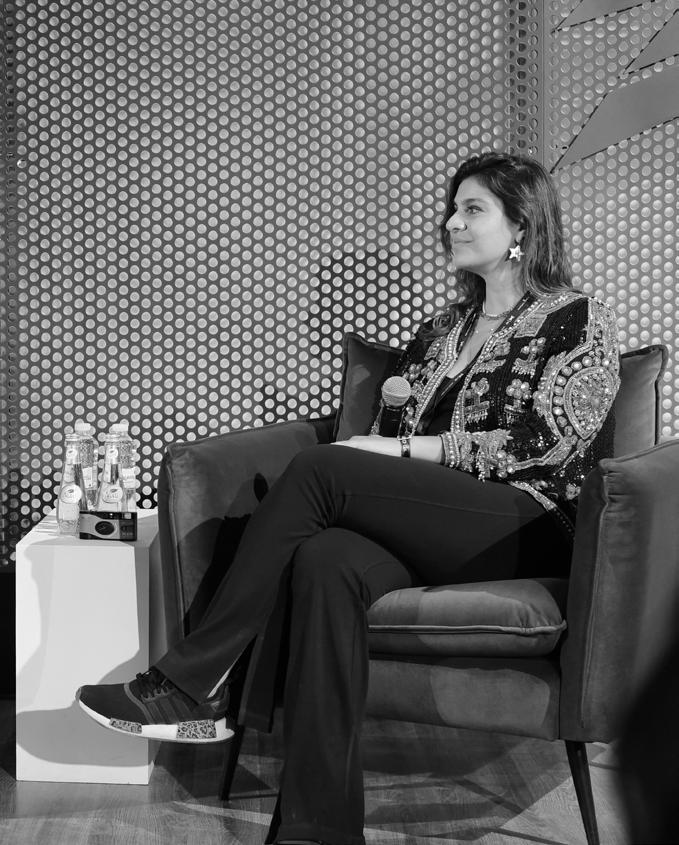
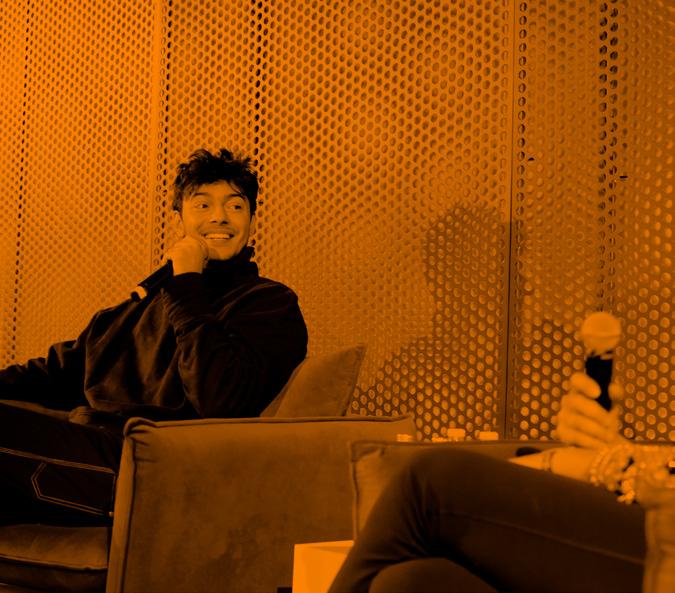


A common thread among geniuses in music is a Magic Ear: a unique ability to hear something others might not and envision its potential. This ability may be developed through extensive practice and attention to the craft of music.
Artists must immerse themselves in the business side of the music industry to avoid exploitation, gaining leverage by understanding different contracts and owning their fan relationships. Leveraging the use of AI, networking and exposure are foundational for aspiring artists, starting in local communities to build rapport and opportunities with different stakeholders.


Venue: Theater
Speakers: Che Pope (Wrkshp Inc), Timmy Mowafi (SceneNoise & MO4 Network)


Venue: Fishbowl
Speakers: Ahmed Shawly (Wall of Sound), Nadine Lingawi (Artist), Amani Seeman (Beirut and Beyond), Lara Khoury (Quartertone S.A.L.), Gigi Arabia (Heavy Arabia Entertainment)

Alternative music involves creating music independently and selfexpression without being too influenced by market trends. Middle Eastern artists encounter challenges similar to global indie artists, and while the industry is vibrant, infrastructure issues exist. Patience is crucial for success, and heavy institutional support is necessary for the independent scene to thrive.
Regarding strategy, there’s no one-size-fitsall approach. Artists can start independently but may require a team as they grow. The decision depends on individual capabilities, needs, and the artist’s vision. It’s also essential to allocate time for content creation and self-promotion. Artists should maintain a good work ethic, consistently produce high-quality live music, identify their own direction, and tap into the support available in the music community.


Being an artist in the digital age involves more than creating music; it’s a comprehensive approach. This includes content creation, collaborations, and maintaining a presence on platforms like TikTok, Instagram, and Twitter. Authenticity plays a key role in achieving success. Staying true to oneself, both in art and content, resonates with the audience and can lead to significant breakthroughs.

Diversifying into other content areas, such as fashion and lifestyle, can help artists attract new fans. However, it’s essential to always circle back to the music and maintain focus on the artist’s core identity. Revenue streams vary across platforms, so tailoring content to unique needs and engagement models is crucial. Understanding each platform’s language is vital for successful navigation.
Venue: Theater
Speakers: Nadine El Roubi, Tarek El Mendelek, Lewis Atallah


The Scene is at the core of our industry. Our emphasis is on naturally expanding our audiences to foster a vibrant music economy. We highlight the significance of communitydriven spaces, ranging from local gatherings to global concerts.


Cross-cultural collaborations in the creative economy offer artists a platform for performance, learning, and fan engagement, reflecting the industry’s openness to partnership and mutual support. Such collaborations impact
the sustainability and scale of events, with Middle Eastern artists operating in a vibrant industry with existing infrastructure issues. Building a thriving cultural movement through a community requires collaboration, innovation, and
established regulatory frameworks to create a supportive environment where artists feel seen and supported by their community and stakeholders.



Venue: Arena
Speakers: Mai Salama (Creative Industry Summit), Hloni Modise (Basadi In Music Awards), Nina Zidani (Palestine Music Expo. Levantine Music.), Namakau Star (Africa Rising Music Conference), Gaurav Narula (WOMEX/ Piranha Arts)



Conferences that bring together musicians, industry professionals, decision-makers, and audiences offer the perfect opportunities to advance creative industries for the benefit of everyone involved. The community plays a central role in shaping the identity and success of a music conference or event, and talent and teamwork are the most critical resources - even more valuable than funds. Collaborating with other industry players can significantly impact the sustainability and scale of a conference. Instead of viewing others as competition, consider them as mentors and resources that can assist in building an event of genuine value for the attendees.

Venue: Arena
Speakers: Mohammed Al Attas (The Warehouse), Dalia Fatani (Studio Lucha), Dr Basma Albuhairan (C4IR KSA) ,Omnia (JAX District)
Building a thriving cultural movement doesn’t happen overnight; it takes collaboration, innovation, and established regulatory frameworks to enable and foster an environment of creativity where artists feel seen and supported by their community and public and private stakeholders.
Community is key when it comes to fostering creative talents - community-building needs venues to thrive. In the physical or digital realms, communities empower artists to hone their craft and receive constant feedback that enables them to take their artistic practice to new heights.
Venue: IHG Meets
Speakers:
Andreea Magdalina (IAMJT), Jameson Thomas (IAMJT), Kyle Nolan (STURDY.Co)

STURDY is a creative agency specializing in branded campaigns, artists, rollouts, visual creation, and ideation, focusing on tour designs and activations for big names such as Bad Bunny, Coachella, and Virgil Abloh. They understand that there
is an importance to bringing music, culture, and brands together through proper curation and finding ways for artists and collaborators to grow together. In entertainment, pushing boundaries and working with innovative perspectives is crucial.
“It’s important to be seen as an artist; you need to have something eyecatching along with your music to be shared. Bringing visual identity to music is something super important.”

Vibelab introduced the Creative Footprint methodology in 2016, aiming to measure and analyze the creative ecosystem of cities from a spatial perspective, with a focus on community engagement, content, and infrastructure. The methodology delves into understanding the mentality of the local nightlife community, assessing their needs, and identifying the responsibilities of both the community and the government to inform policymakers about the unique characteristics of each city’s creative scene and recommend policies based on these insights.
Common challenges across cities include infrastructure limitations for creative spaces, issues with venue ownership, and the need for accessible grassroots initiatives. Cities must learn from each other’s experiences and implement solutions that address the unique needs of their creative communities. Regular communication, facilitated through meetings between the music sector and law enforcement can help normally opposing camps find compromises.

Venue: Theater
Speakers: Lutz Leichsenring (VibeLab), Jane Slingo (VibeLab)


The global conversation on improving women’s representation in the music industry and ensuring their access to education and opportunities is gaining momentum. In contrast to traditional challenges, Saudi Arabia’s recent growth has turned being a woman in music into an advantage.
The significant progress and support from various stakeholders empower women in various artistic fields to have impactful roles. Despite advancements, gender bias remains in the music industry, emphasizing the need for creating genuine opportunities for women in leadership positions to allow for inclusive spaces and a platform for women to learn, innovate, and shine. These challenges that women regularly face foster characteristics like resilience, self-awareness, and the ability to learn from failure in prominent success stories.



Women are severely underrepresented in music as per a recent study in 2023. Despite their growing representation, they still make up a fraction of men in the industry. Female artists should make more effort to support each other
and empower other women artists even by simple things like shares on social media. It’s important to make things easier for upcoming generations of women in music. Saudi Arabia’s exponential growth in the past
few years has made it an advantage, not a setback, to be a woman in music. The impressive evolution and support by all stakeholders is empowering women across all artistic disciplines to step up and take up a bigger role.

Venue: Music Commission Space
Speakers: Nadia Khan (Women in CTRL), Tanya Awad (MDLBEAST), Manar Alhuwiti (Saudi Music Hub), Ileana Yasmine (Music Commission), Ghida Knio (Music commission- Saudi music Hub), Andreea Magdalina (IAMJT), Hala Alhejailan (Music Commission)

The music industry being a maledominated field, like many others, often shapes gender dynamics and opportunity. Women face challenges in these spaces where they are underestimated, dismissed, or held to unrealistic standards. Men and women alike experience an expectation to behave and navigate the music industry in adopting exclusively traditionally masculine ways of working that can compromise rawness and authenticity in their art. Intentional representation is an undeniable goal in the industry in Saudi and the region and it must be achieved through dismantling male-dominance and stereotypically masculine archetypes to guarantee success.

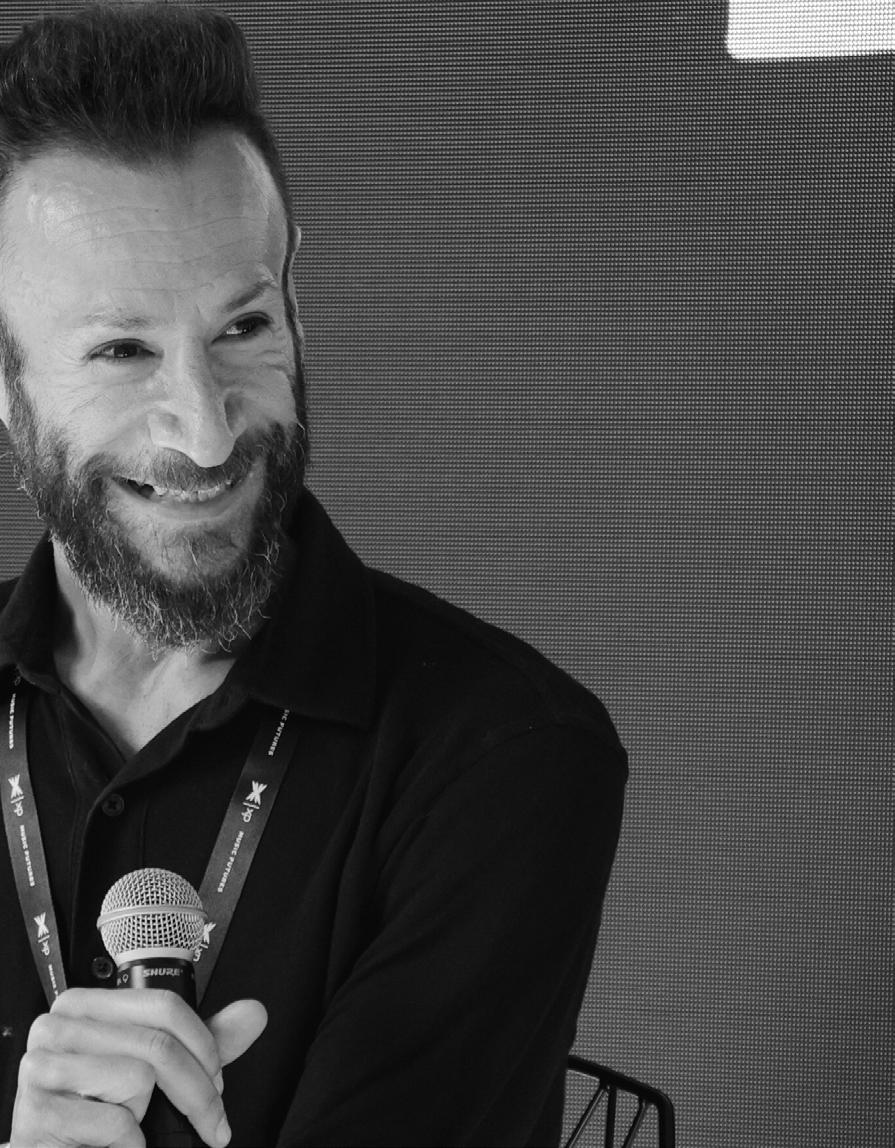
Efforts that can aid in this shift include research-driven approaches that address gender disparities and seek to resolve them, solidarity efforts, education and enablement for women, and an overall shift in the way gender is considered in the industry. An important note is that men also take a role in and benefit from dismantling male-dominance and female representation in the music industry.
A shift towards equity - rather than equality that often takes a one-size-fits-all approachacknowledges and leverages the diverse strengths and qualities that each gender brings to the table, fostering a richer and more dynamic music industry for everyone involved.
HUNNA is an initiative that aims to create a safe space for women in the music industry to form networks, thrive, and seek guidance. It welcomes men to be part of the conversation, promoting a wider objective of equal opportunities for everyone. Female musicians constantly face challenges, both in the Arab countries and globally, including difficulties in finding safe spaces for rehearsals; as such it is important to support female musicians at an early stage.
Female-led initiatives like HUNNA aim to build a supportive community for female artists that include a mentorship program, which provides not only technical help but also psychological support to overcome obstacles.
Venue: Arena
Speakers: Eve Horne (PeakMusicUK/Unheard Academy/Music Producers Guild), Mayssa Karah (Berklee Abu Dhabi), Lynn Adib (Singer and composer), Sarah El Miniawy (Simsara Music / Tarkeeza.com), Tamara Qabazard (Artist), Nourah Alammary (Artist), Haya Al-Hejailan (Music commission)



In the face of adversity, creatives like Balqees Fathi, Nicole Moudaber, and Golnar Khosroshahi have defied expectations and shattered barriers in the music industry. Balqees overcame initial parental disapproval to achieve massive success, emphasizing the importance of positivity, resilience, and staying
true to oneself. Nicole Moudaber, a trailblazer for women in electronic music, broke barriers in the ‘90s Beirut scene, highlighting the necessity of persistence and authenticity. Amidst persisting gender bias in the industry, Golnar encourages creating organic
opportunities for women in leadership roles, with an emphasis on cultural respect and global impact. Their journeys highlight the significance of navigating challenges, prioritizing authenticity, and contributing to a broader cultural shift in the pursuit of artistic and professional success.

Venue:
Theater
Speakers: Balqees Fathi (Artist), Rami Zeidan (Billboard Arabia)
Facing an uphill battle, Balqees Fathi’s artistic career was almost never going to happen after her parents disliked her very first album. She decided to release it anyway and to her surprise and theirs; it was a massive success. Her journey isn’t without failure; in fact, she’s failed a lot. She decided to hire a research company to understand how people perceived her, and the research results informed her recent rebranding and transformation.
Balqees’s recipe for success is to stay positive, learn how to deal with failure, and stay focused on the things and people that matter in your life and don’t give much room for haters to dictate how you feel about yourself and the world. As a woman in the creative industry, she has to balance her roles as a performer, mother, daughter, and CEO, achieving her goals and opening doors for future opportunities.



Nicole Moudaber : Music Mogul To Philanthropist
Nicole Moudaber played a significant role in bringing techno parties to Beirut in the ‘90s, breaking barriers for women in the industry. Her influence had a lasting impact across the Middle East, opening doors for future generations of artists. Nicole gained popularity during a time of little opportunities for women in electronic music - a genre that was predominantly male, and had to leave Beirut for a while when it became dangerous for her.
For artists, it’s crucial to grasp the importance of persistence and staying true to oneself amidst external pressures. They should prioritize authenticity and sustained creativity. Listening to their bodies, avoiding over-commitment, and seeking support from trusted individuals are essential. In the pursuit of happiness, finding a balance between contentment, gratitude, and ambition is key.

Venue: Theater
Speakers: Nicole Moudaber (DJ), Amy Mowafi (Co-Founder & CEO MO4)
Venue: Theater
Speakers: Golnar Khosrowshahi (Reservoir), Amy Mowafi (MO4 Network)

Gender bias persists in the music industry, and there is an importance to creating organic opportunities for women in leadership positions. The focus is on making an impact within an organization first to contribute to a broader cultural shift. In the face of such challenges in the industry, rather than dismantle them, Golnar herself
had managed to navigate them through solidifying a schedule that works for her. She highlights the importance of respecting local culture and having on-ground expertise is key to successful business operations. The goal is to facilitate the movement of culture and impact new audiences globally.

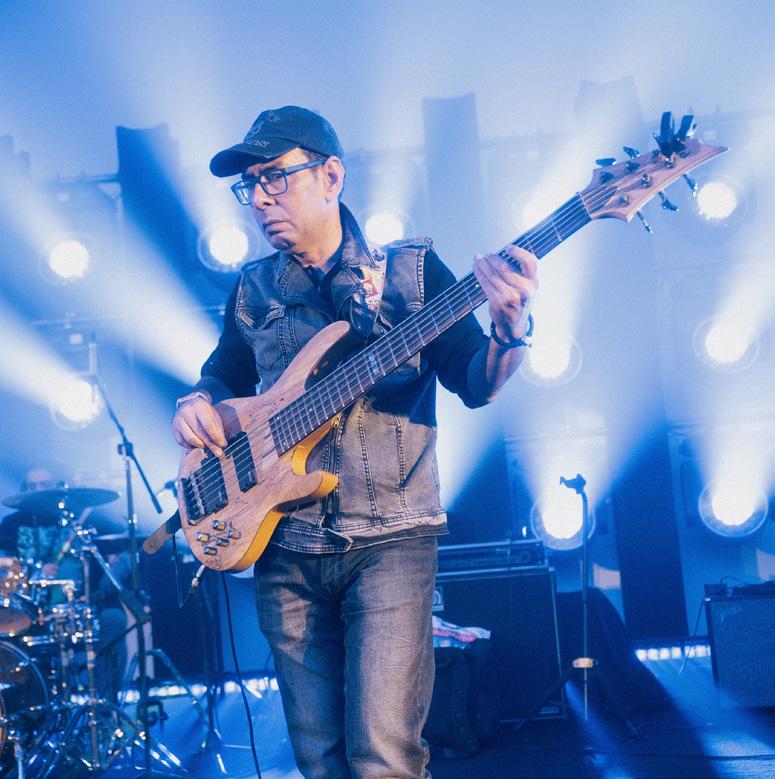
Saudi Arabia’s vibrant nightlife challenges stereotypes through ethics, commitment, and gratitude towards artists.
Building communities is important for club scene growth, with a focus on profitability, innovative marketing, and supporting local talent. Financial challenges, including government policies and high venue costs, negatively affect local talent.
Despite obstacles, fostering a local identity and a sense of belonging remains essential.
Balancing sponsorships, ticket sales, and local support is pivotal for
festivals in regions with limited government backing. Scaling up while maintaining authenticity is challenging, especially in handling sponsorships; collaborating with sponsors on on-site activations is key.
Shifting the paradigm around headliners to spotlight local talents fosters inclusivity and diverse festival experiences beyond music, attracting larger audiences.

Venue: Speakers
Fishbowl Joanna Abou Joaude (Fantôme de Nuit Records / Mahara), Anne Marie Koerten (Event Organizer), Nacho Capello (Amnesia), Tracy Bakala (Yoyaku, Interwave, Whynot)
The interconnectedness of every facet of party planning requires meticulous care and management, with a deep understanding of the contributions of each part of the whole, and being a successful party planner entails a lack of traditional working hours, an ability to cater to multiple stakeholders, and constant travel, requiring a deep passion to sustain oneself in the industry.
In parallel, the thriving nightlife scene in Saudi Arabia shows elevated ethics, commitment, and gratitude towards artists, challenging common stereotypes surrounding the region as a whole.
Venue: Fishbowl
Speakers: Tito El Katchab (Nacelle), Wassim Bou Malham (Factory People), Shermine Sawahla (Malahi Entertainment, Malakat Records, Ctrllab, Esc), Halim Ardie (Club Conscious), Tatiana Arnaiz (Club Conscious)
Building communities is essential for the growth of the scene and the continued success of clubs.
Balancing profitability, innovative marketing, and supporting local talents are crucial for sustaining the regional club scene. Some clubs are exploring a new approach, aligning marketing strategies with a community focus, and recognizing the influence of strong community bonds in boosting event success.
Financial challenges in the Arab world, including government policies and high venue costs, set obstacles in nurturing local talent without solely relying on international acts. Despite these challenges, the emphasis on creating a local identity, authenticity, and a sense of belonging remains important for driving the regional club scene forward.
Venue: Fishbowl
Speakers: Andrea Faroppa (Sónar), Nezar Kadhem (Soundscapes), Karan Badkar (Envision Experiences India), Jenni Cochrane (XP Music Futures)
Balancing sponsorships, ticket sales, and local support plays a pivotal role in sustaining festivals, especially in regions with limited government backing.
Scaling up while maintaining authenticity can be challenging, especially when handling sponsorships. It’s important to work with them on their on-site activations.
Addressing well-being in festivals is evolving, with a focus on providing alternative spaces and diverse experiences beyond music for attendees.
The paradigm around headliners needs to continue shifting to allow space for local talents and to highlight a broader range of artists. Offering diverse experiences beyond music attracts large audiences and fosters inclusive festival environments.


Our Impact pillar is dedicated to empowering and supporting our community by applying knowledge and insight. This allows us to deepen our understanding of the music ecosystem, with a focus on sustainability, accessibility, and social equity as its foundation.
Protecting copyrights is crucial for fostering creativity in the music industry and promoting a thriving creative economy. Saudi Arabia is undergoing a significant legal transformation, pushing for various regulations to safeguard copyright. Collaboration between the public and private sectors is essential to educate and support creatives in protecting and utilizing their copyrights effectively.
Artists must understand royalties to navigate the complex landscape successfully, because the evolving music industry relies on technology, targeted campaigns, territorial understanding, and expansion.



Protecting copyrights is among the most legally efficient enablers of the creative economy and is an indispensable tool to incentivize creativity in the music industry. Saudi Arabia’s legal framework is undergoing a major shift with a focus on a wide range of regulations and policies that protect copyright, and its public and private sectors need to join hands and work together to promote and inform creatives on how to protect and utilize their copyrights; this is because new technologies like AI presents a major unaddressed challenge to protecting the copyrights of musicians.

Venue: Arena
Speakers: Nada Al Tawajri (Merwas Audio & Visual Production Company), Rumayan AlRumayan (Merwas Audio & Visual Production Company), Saud Ahmad Alghamidi (Saudi Authority for Intellectual Property), JEME (Artist)
In the music industry, royalties can come from both the composition and the master recording, which is the physical or digital file of the final recording. Typically, labels own the sound recording, while publishers handle the musical composition. Labels get the master royalties, while performance and mechanical royalties are overseen by publishers. Master royalties are the royalties attached to the final physical recording, performance royalties are shared amongst all performing musicians on the track, and mechanical royalties are handed to technical staff working on the music. Understanding this distinction is essential for artists to navigate the complicated landscape of music royalties.
Collaborating with labels, publishers, lawyers, and managers helps artists in understanding royalty agreements, ensuring fair compensation, and securing proper representation in negotiations. Accurate metadata, which contains information about a song, is crucial for collecting royalties. Inconsistent metadata, coupled with artists not registering with PROs, contributes to unclaimed royalties, is estimated at around $2.5 billion.
Venue: Arena
Speakers: Iain Hagger (MDLBEAST Records), Naima Menxhiqi (We Matter Music), Sjoerd Koolwijk (William Cole)






Venue: The Saudi Music Commission Space Speakers: Shain Shaprio (Center for Music Ecosystems), Gregor Pryor (Reed Smith LLP), Gary Cohen (Simpatico Music & Brands), Nada Al-Tuwaijri (Merwas Audio & Visual Production Company), Hala Alhedeithy (Music Commission)
In formative years of the Saudi music industry, it’s important to shape it into a sustainable model with the ability to endure and achieve longevity on a global scale. After a gap analysis was conducted, Merwas Audio & Visual Production company stepped in to fill three main gaps in the market - the lack of quality studios, record labels to supply to the talent, and spaces for artists to meet and collaborate. Other gaps exist - but with further development within the artist management industry, coupled by the development and enforcement of copyright laws ensuring artists are paid, are critical steps towards creating a sustainable music sector.



Paradise Worldwide is a company that focuses on and takes a modern approach to music distribution and rights collection as rights managers, aiming to combine rights, recognition services, and data translation to support artists and labels. It is important to have independence
as an artist, including keeping rights, generating cash flow, and becoming your own business.
With the shift in the music industry, technology, targeting, campaigning, understanding territory, and the extension of territory play crucial roles. As
such, being unique, showing interest in services, and staying updated with industry trends are vital. The multifaceted nature of the music industry makes strategic planning, and building the right team key elements for success.


Artist managers face challenges in utilizing artist data effectively, emphasizing the importance of data in strategic decision-making for audience insights and tailored growth strategies. Adopting a
comprehensive approach by considering markets, events, and the artist’s career vision is essential to stay relevant and adaptive, have market awareness, good negotiation skills, and thick skin, particularly in the growing MENA region.
It’s also important for managers to consider their mental health, requiring them to set boundaries while establishing trust and effective communication with the artist for a successful partnership.
In the MENA region, there are varied music consumption habits across more than 20 countries, allowing different industry sectors to customize services based on specific genres and local preferences. Data plays an important role in artist development, supporting strategic decision-making by providing insights into audience demographics, retention rates, and helping create tailored strategies for sustainable growth.
MENA stands out as the fastestgrowing region in the industry, offering significant opportunities for artists to reach a global audience. The Arab diaspora and the region’s distinct sound contribute to the global appeal of local artists. Artist managers should adopt a comprehensive approach, considering the market, events, and the overall career vision of the artist. Effective time management is crucial, especially in international campaigns where lead time plays a key role.
Venue: Arena
Speakers:Karima Dima (Sony Music Entertainment Middle East), Ahmed Nureni (Warner Music MENA), Onur Al Aydin (Warner Music MENA), Adriana Sein (ADA/ Warner Music)
Venue: Fishbowl Speakers: Eddie Maroun (Anghami), Meike Nolte (Believe), Alain Zovighian (bolero), Timmy Mowafi (SceneNoise & MO4 Network)

The disparity in subscription rates across regions affects artist payouts from streaming platforms, with the Middle East experiencing lower rates due to pricing differences. While emerging tech like NFTs and blockchain-based models hold promise, their widespread adoption faces challenges due to oversaturation, financial volatility, and the need for effective use cases.
Newer models like blockchain-based royalties and fan engagement through platforms offer artists more control and opportunities to monetize their work while building loyal fan communities. Playlisting is essential, but organic engagement, fan data ownership, and diversified revenue streams (like brand collaborations and merch) are becoming pivotal for artists.
The power dynamics between artists, record labels, and streaming platforms are evolving. There’s a shift toward more personalized, engaged relationships with fans, highlighting the importance of community-building over mass appeal.

Adapting the work process based on the artist’s personality changes depending on the artist.
There needs to be a personal and professional balance, nurturing a sibling-like relationship, and maintaining boundaries for sustainable artist management.
There is an importance in managing expectations and setting boundaries to avoid misunderstandings about the
manager’s role in the business aspect of artist-manager relationships and a need for clear expectations and communication.
As an artist manager, it is important to stay relevant, adaptive to market trends, have a good ear, and stay curious about different music genres. There is also a need for thick skin, assertiveness, negotiation skills, and market awareness, especially in the growing MENA region.


Venue: Fishbowl
Speakers: Spyros Bonikos (The Bullitt Agency), Roberto Blach (Zero Logistics), Bridgitte Armengol (Creative Director), Tracy Bakala (Yoyaku, Interwave, Whynot)


Successful events demand a mix of artist coordination, aesthetic considerations, media planning, and meticulous operations, especially in highly competitive markets.
COVID-19 signaled a reinvention within the industry, forcing professionals to navigate financial constraints and shifts in audience behavior and to
Venue: Fishbowl
rethink event promotion strategies within tighter budgets. The demands of the job take a toll on mental health.
There’s a need to set boundaries to maintain well-being while managing the relentless nature of the job. While social media following impacts artist bookings, authenticity and music quality outweigh follower counts.
Speakers: Sarah Nabil, Sarah El Minawey, Omar Gawdat, Hamdy Badr
Building trust and effective communication between an artist and manager are crucial for a successful and fruitful partnership. Being a successful manager entails tailoring management approaches depending on the artist’s preferences, creative process, and communication style, and having managerial support allows artists more time and mental space to focus on their creativity and on producing more work.
However, an artist’s drive and commitment to growth and selfimprovement are significant factors in attracting management attention, more so than their current following.


Government policies in the music industry focus on trade, export, and revenue, with export offices playing a crucial role in providing funding and organizing the export process. The diaspora acts as a bridge, connecting communities and increasing global
music reach, with the internet playing a vital role in global music spread. In Saudi Arabia, government support is crucial for fostering creativity in music, aligning with Vision 2030 for a thriving creative economy. The
industry is open to partnerships and mutual support, highlighting the significance of creating platforms for artists to engage with fans and foster a vibrant local artistic community.
Venue: Arena Speakers: Jake Beau mont-Nesbitt (International Music Managers Forum / Acme Rights / Artists Business Campus), Phil Patterson (Department of Business and Trade UK), Pamela Owusu Brenyah (Pop-Kultur, Afro x Pop), Sifiso Gcabashe (The Dig and Untitled Basement)
Export offices play a crucial role in building infrastructure by providing funding and organizing the export process, helping artists avoid repeated mistakes. The diaspora acts as a bridge to success, connecting communities and helping in increasing the global reach of music. The internet is essential for spreading music globally.
Artists are advised to initially build a local audience before expanding globally. Embracing and celebrating local identity, language, and culture helps create a unique and exportable sound.

Securing Funding Government-developed music policies involve aspects like trade, export, and revenue, contributing to soft value and soft power. Residency programs offer artists opportunities to focus on their music in different locations, promoting collaboration and valuable experiences.
Venue: Music Commission Space
Speakers: Ralph Boge (Paradise Worldwide), Adhwa Fahad (Actress), Aiman Ouklah (Misk Foundation)

Creative economy is an umbrella term for many diverse industries that typically aim to entertain - from music to gaming. The creative economy has a great cascading effect on GDP - a simple activation or event could create dozens of jobs, and inject cash into various supporting industries that make the creative world possible.
Hosting an art walk means working with local food and beverage companies, local design firms, local artists, content developers and so on - creating a domino effect within the economy. The creative economy is expected to contribute to 3% of the GDP by 2030 and generate 100,000 jobs. In the pursuit to develop Saudi into a global player in the creative world - knowledge spillover and crossfertilization matter, but preserving our heritage remains to be of utmost importance.

Music policy in different countries comes in different shapes and forms. In Saudi Arabia, starting from a clean slate, government support and enabling is crucial to fostering and allowing an environment for creativity in music; it is en route to build a thriving creative economy as per its Vision 2030. Just like in other fields like sciences, sometimes government intervention and funding is crucial to the development of a creative ecosystem



which might not be directly financially rewarding but that will have long-term economic benefits. Music and creativity aren’t just creative self-expressions, they can be the backbones of a national or city economy like Berlin or Nashville.
Venue: Arena Speakers: Jake Beaumont-Nesbitt (International Music Managers Forum / Acme Rights / Artists Business Campus), Lutz Leichsenring (VibeLab), Mai Salama (Creative Industry Summit), Paul Pacifico (Ministry Of Culture)

Anghami is dedicated to supporting the community through initiatives that offer local artists platforms, exposure, and resources. This reflects a comprehensive approach to empowerment. Merwas prioritizes investing in infrastructure and sustainability. The academy’s varied curriculum aims to fill market gaps, contributing to Saudi Arabia’s economic growth and supporting artists in diverse aspects of their careers.
Venue: Arena
Speakers: Nada Al Tawaijiri (Merwas Audio & Visual Production Company), Nada Alhelabi (MDLBEAST), Eddy Maroun (Anghami), Arwa al Ali (The Diriyah Biennale Foundation)
Spaces like Anghami Lab and initiatives by Merwas and Diriyah Biennale Foundation highlight the significance of creating physical spaces for artists to experiment, perform, and collaborate, fostering a vibrant local artistic community. A collaboration between Anghami Lab and Merwas provides artists with a platform for performance, learning, and engaging with their fans, showcasing the industry’s openness to partnership and mutual support.
11
Music holds diverse healing potential and overcoming financial and accessibility constraints is essential for promoting affordable well-being practices. Awareness campaigns and mental health support are crucial in industries prone to burnout, necessitating a shift in organizational priorities toward employee well-being, while promoting bodily health and listening to your body is important to enhance endurance and prevent cumulative negative effects over time.
At XP Music Futures 2023, we set up The Healing Oasis, a dedicated space to promote and share information on wellbeing; it was a sensory experience that combines the healing power of nature, music, and art to offer a space of respite for attendees.
The space was designed as an immersive forest with lush trees and rich plants to give a calming atmosphere, as well as an interactive art installation that uses light, sound, and projection to create a multisensory experience. The installation responded to the natural surroundings and the music being played at the conference.



Venue: Fishbowl
Speakers: Jenni Cochrane (XP Music Futures), Emma Marshall (Movement is Medicine), Krystal Roxx (Artist), Bayan Abuzinadah (Mantra the Label and Heart Saudi), Bruno Cabral (The B Frequency, Half Baked Records, Number 90 Bar, Starlane pizza Bar)
Music’s healing potential is varied. Approaches like Movement Is Medicine and frequencybased therapies aim to redefine music’s role in the well-being space, making wellness practices more accessible. Wellness doesn’t have to be expensive, and there’s
a need to bypass financial and accessibility constraints that make well-being practices difficult to utilize. Awareness campaigns and mental health support in industries prone to burnout are a must, along with normalizing conversations and restructuring organizational priorities toward employee wellbeing. The younger generation is more aware of the massive repercussions of burnout and is more in touch with wellness practices.

Raising awareness is the most crucial tool to promote hearing health since misconceptions and false information about hearing loss are widespread. The impact of sound exposure on hearing health depends on various factors including volume, the duration of exposure, the intensity of the sound, and an individual’s susceptibility to hearing loss. Hearing health isn’t solely affected by sound exposure; factors like genetics, medication, and cardiovascular health play roles in hearing loss.
Devices like smartphones and earbuds contribute significantly to potential hearing loss. Thanks to efforts from the WHO, various tech companies have started incorporating warning systems for loudness levels on their devices. Annual hearing tests, especially for people working in the music industry, are essential so as to not accumulate hearing damage over time.
Venue: Theater Speakers: Dr. Michael Santucci (Sensaphonics), Nurzy (Artist), Nazli Reda (Nazli›s Noise), Bader Assery (MDLBEAST)
Our Innovation pillar engages with the latest developments in the creative tech space, highlighting the transformative impact on the music industry. We consistently seek insights from tech pioneers to enhance our understanding of the future of music and technology.


The synergy between art and technology empowers artists to broaden their horizons, delivering and understanding immersive experiences through the embrace of new technologies. AI not only transforms how art is created and consumed but also redefines the very concept of creative work and mastery in artistic disciplines. Increasingly, artists can leverage its potential to their advantage,
as its integration is inevitable. Technology serves as a catalyst for cultural and artistic growth, making the creative landscape more accessible and providing opportunities for artists to showcase their talents to global audiences.

Art and technology go hand in hand; by embracing new and advanced technology, artists are able to step out of their artistic practices and become fully-rounded artists able to deliver and understand immersive experiences on a new level.
An immersive arts experience has to include music that not only adds to the artistic experience, but is an integral part of it that can elevate the audience’s experience and awareness of the art they’re consuming.
Venue: The Fishbowl
Speakers: Nouf Al Moneef (Riyadh Art project, RCRC), Eiichi Sawado (Artist), Nadine Khalil (Metis Art Education), Maryam Tariq (Visual Artist)


Not only is AI perhaps changing how we create and consume art, but it may also completely alter the very notion of what constitutes creative work and what it means to be a master of an art discipline. Just like any technology, AI is a tool that can be used for good or bad - but its rise is inevitable, and as such it’s encouraged for creatives to adapt and learn how to use it to be able to keep up with their creative fields.
AI is not going to replace humans; but it’s people who use AI well that will probably be able to stay ahead.
The panelists held the firm belief that current and future generations aren’t going to be defined only by their names, countries and DNAs, but also by their cumulative tastes and preferences since birth which are all gathered in the form of data and processed by machines that will know the inner workings of our brains better than we do.
Venue: Arena
Speakers: Moustafa Shirah (Syrup), Rachel Lyske (DAACI), Cliff Fluet (Lewis Silkin LLP/Eleven Advisory)
Venue: Arena
Speakers: Mohammed Al Attas (The Warehouse), Dalia Fatani (Studio Lucha), Dr Basma Albuhairan (Centre for Fourth Industrial Revolution KSA (C4IR KSA), Omnia (JAX District)

Technology is a major enabling element for the growth of cultural and artistic movements in any society. Community is key when it comes to fostering creative talents, and as such technology encourages direct relationships between emerging artists and platform curators. Artists can generate income through streaming, live performances, brand collaborations, merchandise sales,
teaching, workshops, and government incentives. Tools like AI, NFTs, Metaverse, and, above all, social media, are tools that level the playing fields for artists and enable anyone with an internet connection to showcase their talents to local and global audiences
Technology like Web 3.0, blockchain, and NFTs is an important tool in decentralizing music platforms, granting artists greater control and accessibility to their creative work. Data and metrics are powerful assets, offering valuable insights for artists and managers to understand audience engagement.
Staying at the forefront requires musicians to adopt content strategies that involve user-generated content and align with current trends. Success in the music industry demands leadership qualities, strategic thinking, analytics utilization, and the effective use of platforms to reach target audiences. Building a solid team that understands platformspecific requirements is essential for the success of an artist’s career.

Venue: Arena
Speakers: Anna Jenniskens (Collabhouse), Elia Mssawair (GXR Records), Salwa Radwi (Nuqtah), Venus Kaassamani (STEP Conference)
Utilizing technology such as Web 3.0, blockchain, and NFTs to decentralize music platforms is an important tool for accessibility in the music industry, providing artists with greater control and power over their creative work.

Traditional music labels face strong competition from decentralized platforms, challenging their role as intermediaries between artists and audiences. While their business model is not disappearing soon, it is expected to evolve within this new ecosystem.
The key to enabling these technologies is building awareness of Web 3.0 and blockchain. Industry players should focus on bringing value to artists and consumers through these cutting-edge technologies.
Speakers:
A superfan is a fan who is highly engaged with the artist and directly invested in the success of their careers.
They invest money and effort to ensure the artist remains successful and popular. Artists only need a small number of true fans for them to make a living, so artists shouldn’t get derailed chasing numbers and followers. Instead, they should focus on staying genuine to their art, while utilizing social media efficiently, and fans will follow.
Data and metrics are powerful tools artists and their managers can use to understand what they’re doing right or wrong. They can provide valuable insights into what would engage fans the most.

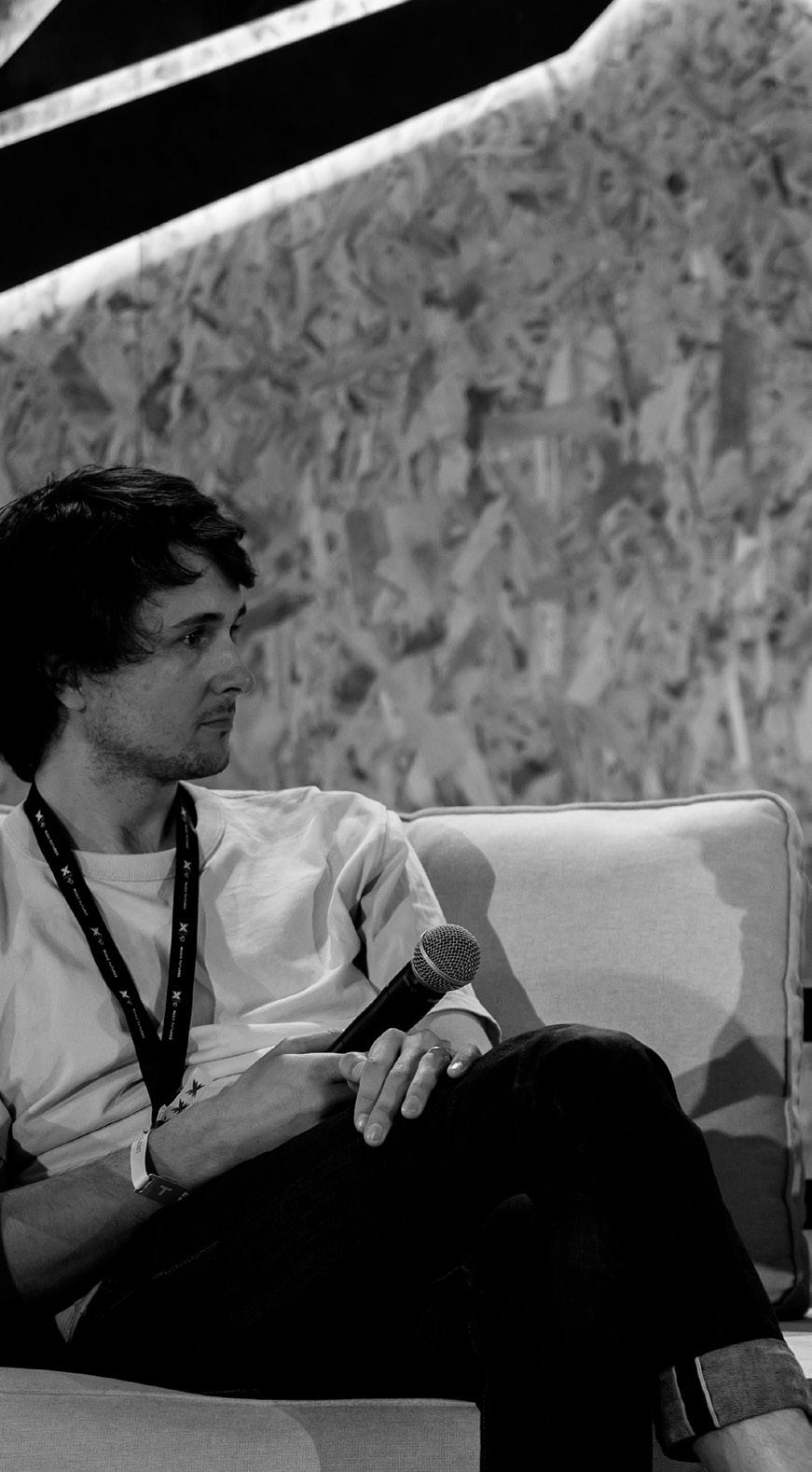
Venue: Arena
Speakers: Chiara Santoro (Singer and Actress), Craig Sanders (YouTube), Julie Chavassieux (YouTube), Omar Kabbara (YouTube)

YouTube is an essential and instrumental tool to musicians - if not the most significant. Making it on YouTube guarantees visibility and success for musicians who are able to use it best.
Musicians have to remain active and utilize all multi-content formats on YouTube to ensure success on the platforms. Understanding one’s channel’s analytics and reacting accordingly can reap great results.
User-generated content is booming on the platform, making up a third of all revenue generated in 2022. To stay at the top, musicians need content strategies that keep them engaged with usergenerated content and trendy.


TikTok is a driving force for the music industry and one of the most, if not the most, important tools artists have to reach audiences regionally and globally. Staying true and genuine to who you truly are as an artist is the shortest way to get the audience to engage with your content and music and be touched by it.
Involving fans in your creative decisions and asking for their support to get to the next level is now possible with platforms like TikTok. However, artists should be mindful to give true value to the fans and the fans will return the favor.
Venue: Arena
Speakers: Georges «Josh» Rouhana (TikTok), Moe Hamzeh (MDLBEAST), Mishaal Tamer (Artist)
Venue: Arena
Speakers: Chiara Santoro (Singer and Actress), Craig Sanders (YouTube), Julie Chavassieux (YouTube), Omar Kabbara (YouTube)

As an independent artist, it is important to understand data, monetization, and being unique in the industry. To be successful in the business as an artist, you need to have leadership qualities, be strategic, check analytics, and use platforms like Instagram to reach the target audience. Have a solid team that considers platformspecific requirements and infrastructure when promoting you as an artist.

There are three stages of data utilization: The first includes raw social media data, the second includes DSPs along with the social media data, and the third features performance plays and recognition services. Understanding data is crucial for targeted campaigns and reaching the right regions, and artists need to be reasonable with spending and align it with growth. Legal considerations for AIgenerated music need to be addressed, and the situation may become clearer in the future.


With XP being a music driven conference, DAY cannot be complete without its music. What makes DAY music unique is its experimental nature– while NITE welcomes musicheads to indulge in their respective niches, DAY invites the community to explore new sounds and further develop their palate. DAY music set the soundtrack to our mornings and the remainder of the conference.
Najd Choir
Raif
Layal Abbas
Tutu
Vegie
Nourah and the Nice
Band
Tamara
Moody Rothstein
Yal Solan
Adam Kadabra
WhomadeAB
Doyoureallylikeit?
Louie Tigga
Futureloop
Thirty3ree
Salamander
Among DAY music local talent curated by the Saudi Music Commission that encompassed both traditional and contemporary sounds.
Noori and the Piano Story House of Oud
Thirty3ree Salamander



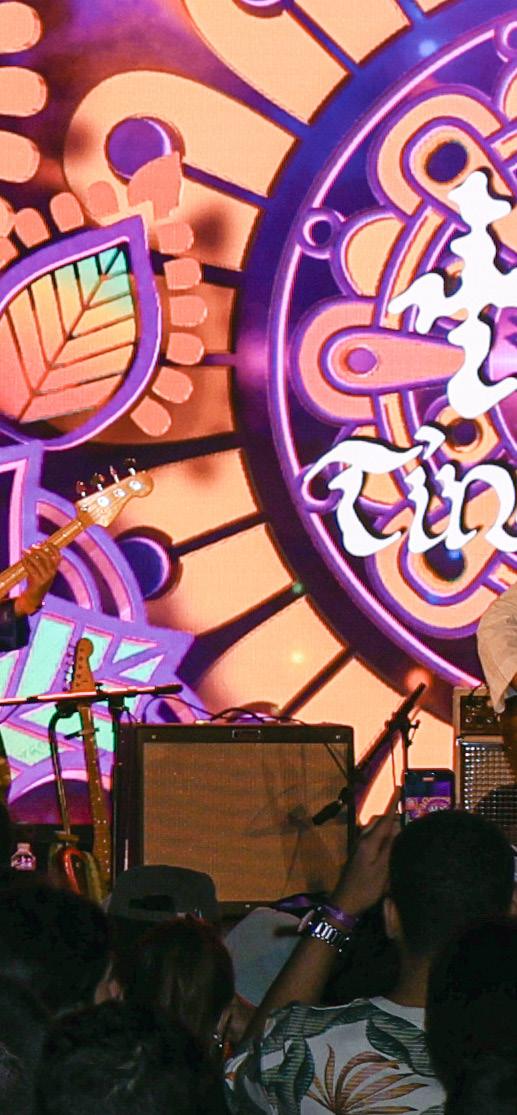

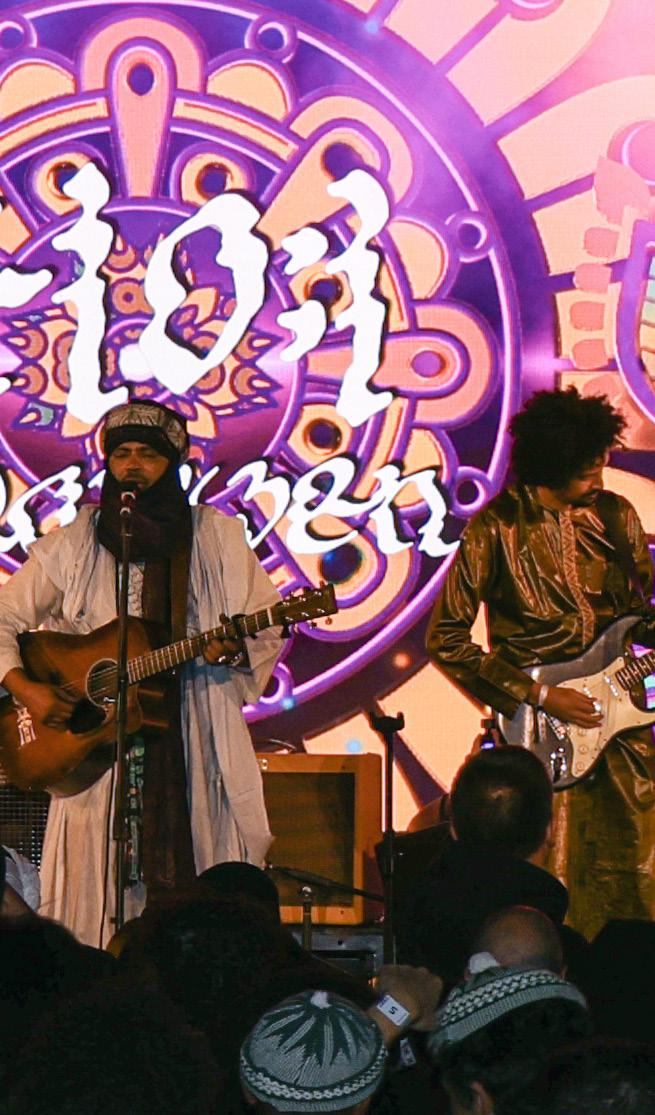


The music industry is a vast ecosystem of many interconnected areas of expertise. It encompasses visible roles like performers, their managers and labels - and lesser known but equally impactful areas, like visual jockeys, financiers and researchers who help make the music scene flourish. At XP Music Futures, we crafted 7 different initiatives, all with a particular focus on one facet of the multidimensional music industry.
Hunna was sprung up from the need to create a more equitable music industry that services women, while Sound Futures was made to help incubate, develop and uplift music related startups. Our two artist pushing initiatives include Storm Shaker and XPerform, while the former focuses on DJs, XPerform gives the floor to singers, rappers and vocalists to showcase their art and talent.
XCHANGE comprises a sequence of workshops ignited by the boundless potential of MENA’s music landscapes that takes place in four distinct cities annually. These workshops serve as catalysts for advancing our music industry, igniting vital dialogues in preparation for our annual XP Music Futures conference. The observations, conversations and contributions from these valuable workshops are synthesized and published through the annual Xine.
We also got the Artist Management Bootcamp which offers a rigorous two-week virtual program crafted to launch your music management career with immersive workshops, mentorship sessions, and engaging interactive discussions.
These initiatives, abundant and rich, only scratch the surface of what can be learned, taught and gained in these unique areas of the music industry.





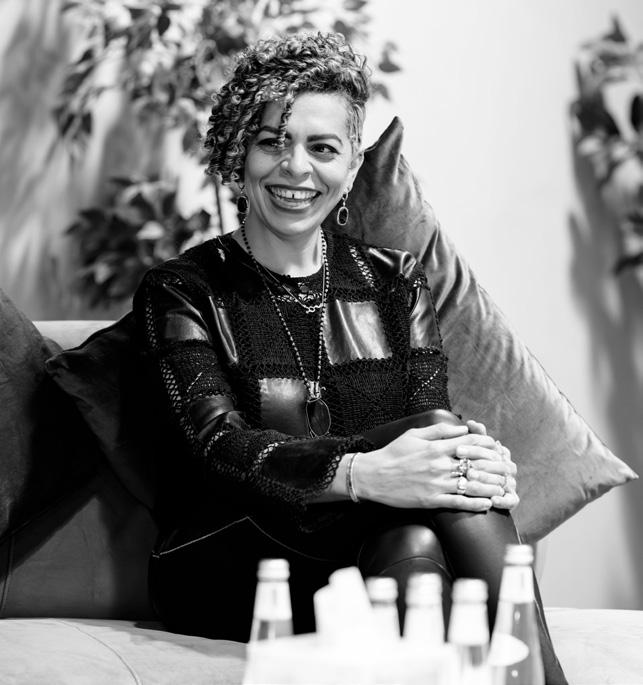
HUNNA is a new addition to XP’s growing initiatives and is a matchmaking mentorship program and series connecting female rising stars in the region with established women in the music industry. The firstever HUNNA gathering took place at the XP conference, where we brought together 2023’s 4 mentor and mentee pairs and leading female and male allies from across the music sector to congregate and celebrate the impact of this year’s program. This gathering also served as the first live performances by our mentees. Our 4 participants–coming from Kuwait, Lebanon, Oman and Saudi–were chosen for this program spanning Music Business, Music Production, Music Management, and Artistry. The three-month mentorship included a customized program for each rising

artist with 4 “virtual listening circles” fostering community engagement and addressing issues related to equity in the music industry.
The gathering featured incredible performances and a short presentation on the findings and results of the mentorship program. It connected like-minded individuals from across the region and beyond to discuss the challenges and opportunities currently facing women in music and how we can work in community together to ensure the talent (both music & business) is provided the resources and support it needs to thrive. After a successful first year, we now have a growing network of over 100+ women in music in the region, 4 press releases, and an over 100k audience reach on social media.


XPERFORM is the ultimate catalyst for MENA’s aspiring vocalists, on a mission to uncover the region’s emerging talents through a singing contest that puts star quality, charisma, and vocals to the test! In collaboration with YouTube and sponsored by Formula 1 STC Saudi Arabian Grand Prix, contestants get the chance to showcase their talents through a competition open to all MENA talents.
With 126 applicants– 99 of which male and 27 female– this year, AJ Truth was crowned as the winner and took the stage, scoring a careerboosting opportunity to work with MDLBEAST Records; AJ Truth will also get the chance to perform on the main stage during the 2024 Formula 1 race weekend along with the top 10 contestants who will perform all across the site.


XCHANGE is a series of workshops fueled by the endless potential of MENA’s music scenes. Hosted in four different cities every year, these workshops are catalyzing the growth of our music industry, sparking important conversations in the lead-up to our annual XP Music Futures conference. We bring together industry experts for vibrant dialogues, talent showcases, and cultural exchanges, all centered around XP’s four core pillars. These conversations help us paint a picture of the MENA music market and its trends, pain points and strengths to help better inform XP Music Future’s programming. When the workshops wrap up, the party takes over with XChange Nite - connecting local and regional talents, turning each evening into a musical exchange.
Last year, the cities visited were Abu Dhabi, Amman, Cairo, and back to Riyadh. Our partnerships were crucial to the success of these workshops. XChange partners with local entities who are part of the fabric of their music industry, and collaborate on developing the workshops to ensure that the right mix of attendees are in the room - hosting a diverse group of music industry pros, from artists to labels to managers.
XChange partnered with Berklee School of Music in Abu Dhabi, hosting the workshop with 30 attendees. In Cairo, 40 music pros participated in the workshop with Scenenoise, with 150 partygoers joining the dancefloor at Consoleya. Amman’s Malahi Entertainment helped bring in 40 workshop attendees in Manara, and 100 guests for XChange Nite. Relying on our own network to host Riyadh, XChange hosted 40 attendees for the workshop, and 150 for XChange Nite at the Warehouse.

The outcomes of the XChange workshops are cataloged, organized, and presented to readers through Xine. Inspired by fan zine’s of the 70’s-90’s - this editorial is a love letter to the regional music ecosystem. It is a summary of the outcomes of the research and talks conducted through XChange, with written and visual contributions from creators, designers, journalists and more from across MENA.
The final version of the Xine had work from eight talented contributors from the four countries visited in XChange during 2023. Six of these contributions were journalistic essays exploring different facets of the regional music culture and industry. Two of these contributions were photo essays that authentically capture Riyadh’s music communities.

In collaboration with MDLBEAST, XP Music Futures has launched a competition in search of the next great regional DJ. With 311 applicants, 10% of which were women, the competition this year included contestants coming from 36 countries. 14 countries were regional while the remaining 19 were countries from across Asia, Europe, and Africa, demonstrating an increased interest in performing in the region. The competition aims to give emerging
DJs a platform on which they can step up and rise into the global music scene. Each submission is evaluated based on criteria ranging from originality, technical mastery, creative expression, and audience engagement. The competition is judged by industry veterans, top DJs and producers, and in XP Music Futures 2023, the winner was Thirty3ree, who got to perform at Soundstorm.
Sound Futures is an incubation program igniting the passion of tomorrow’s music industry leaders in MENA. In partnership with SEA Ventures, we’re on a mission to uplift the region’s music and tech industry, one idea at a time. This is done through a four-day intensive training program, promising entrepreneurs the chance to further develop their ideas with the help of the incubator. 75% of applicants were from Saudi, 15% from Egypt, 5% from the UAE and the remaining 5% from other MENA countries.
Out of our 37 applicants, 8 finalists got to present their business venture to top investors such as Ziad Jarra (CEO of Taurus Ventures) and Abdulsalam Alkuwaity (CEO of SEA Ventures) during the Pitch Day at the XP Music Conference 2023, and 3 of the finalists managed to receive fruitful feedback, funding, and are in further development stages with investors.
Accrued funding is still not available to us at the moment. We can just say 3 startups received funding and further development with the investors.

The Artist Management Bootcamp is an intensive virtual 2-week journey designed to kick-start your music management journey through workshops, mentorship, and interactive discussions. Gain industry-specific insights and the chance to learn from leading industry experts ahead of the XP Music Futures 2023 conference.

XP Air is our very own onsite streaming container that hosts interviews, sets, and features brand takeovers from the day and nite program’s artists and industry leaders. It’s a radio program that gains insight from musicians regionally and internationally.
Managers are at the heart of a musician’s career, guiding both everyday tasks and long-term strategies. At XP, we are driven to support every step of MENA’s music ecosystem by nurturing a talent pipeline that produces successful artist managers, as well as paving the way for sustainable careers in the industry through enriching the skills and business knowledge of artist managers in the region.
In our XP Air talks, artists have in-depth conversations about their careers, sound and experiences, followed by electric DJ sets to close off the sessions that draw a crowd in for an intimate experience.

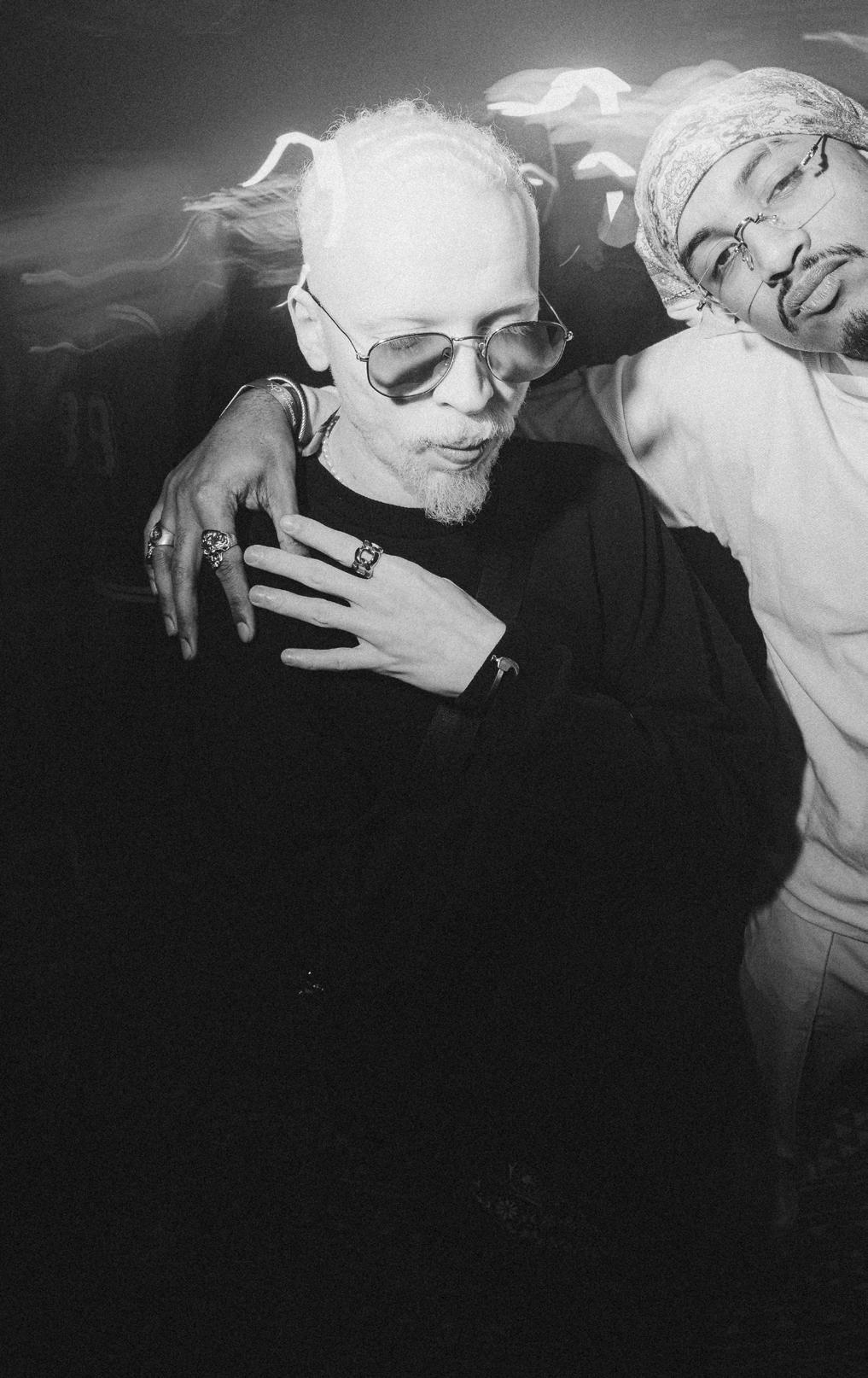








As the Day programming came to a close, and the sun set, our Nite programming came to life - transforming JAX into a vibrant celebration of music and culture.
Annually, we invite regional party brands, promoters and record labels to take over the conference site and activate warehouse by warehouse. They bring in their unique perspectives, curated tastes and musical inspirations that make our regional scene vibrant and robust. This year, a handful of these collectives collaborated with international counterparts - bridging the gap between near and far through the universal language of dancefloor realness.
From DJ sets across electronic genres, to soulful live performances - our diverse Nite programming reflected the regional scene, cultural heritage and contemporary trends in the Middle East.
The fusion of traditional Middle Eastern sounds with modern music elements was a highlight, illustrating the dynamic and evolving nature of the region›s music scene.
The program this year introduced Heavy Metal, a space dedicated to Disco & Experimental sounds, and featured a variety of genres, including all the flavors of House, Techno, Metal, Rock, Indie, Blues, Hip Hop, Afrofusion, and Experimental music.

The Nite program featured 160+ artists across 6 main stages and offered guests a sonic feast as they hopped between different showcases throughout the three days.


200+ artists performing both in the Day and the Nite.
6 collaborative showcases between regional and international labels/ collectives.
24 brand showcases, with 30 music collectives & labels from KSA, UAE, Palestine, Jordan, Egypt, Lebanon, Tunisia, Sudan, UK, and France.
Artists from 30+ countries from the MENA, diaspora & international, with a 40/60 female/male artist ratio.
4,200+ attendees during XP Nite. In terms of partnerships, Spotify collaborated with Femmefest to showcase a lineup of female powerhouses in the region’s music scene.
The Saudi Music Commission had bespoke Nite programming, highlighting local talents across various genres.
For our Nite programming, XP set up six separate venues to cover a stellar lineup packed with beautiful performances by some of our favorite artists. These venues are:
X1 This electric space hosted both our artist competitions, XPerform and Stormshaker, as well as performances put together by Vortex (Jordan), MDLBEAST Records (KSA), WTR X Somewhere (KSA/Lebanon), DJ Michelle (UAE), Tinariwen (Mali), and Femme Fest X EQUAL ARABIA (UAE)
X2 The performances featured in this space were hosted by Narratives (KSA), Chelina Manhutu (Netherlands), Syrup (KSA), Karaz Disco (KSA), Heavy Arabia (KSA), and Wall Of Sound (KSA).
X3 Included performances organized by Fabrika (Tunisia), Noctuary X Yoyaku (KSA/France), and Trommel (Worldwide).
X4 This venue featured performances brought together by Untamed (KSA), Madhaus (KSA), and Loop X Imagine Family (KSA/France)
X5 Famously a hip-hop stage, this venue hosted performances curated by Brij Ent (KSA), Ego Records (UAE), GXR Records (UAE), Middle Of Nowhere (UK), Scene Noise (Egypt), MDLBEAST Records X SVNBIRDS (KSA/Sudan)
X6This venue included performances by Malakat Records (Jordan), Aadi X Distrikt (KSA/France), Electric Days (UAE), Nacelle (Egypt), Tribalneed, and the Block Party.
The Music Commission Stage: This stage hosted performances by DJ Fa, Laughta, DJ Sain & Mo Hakim, Ghida Knio & Ileana Mahmood, Mazen & Co., DJ Faisal, and an Arabic Ensemble.

Chelina Manuhutu Abyusif (by Scenenoise)
Heavy metal band 9six6 (by Saudi Metal collective Heavy Arabia)

Satoshi Tomiie & Cabanne (A collaborative showcase by local favorites Noctuary and French label Yoyaku)
Session Victim (by Nacelle)
Soulja & Dafencii (by MDLBEAST Records x SVNBIRDS)


Zeina Mates (MDLBEAST Records)
Freek (by GXR Records)
Joyce Muniz & Doudou MD (by Electric Dayz)










Alaa
Chelina Manhutu
Joh Dimas
Monile
Majid
Nesta
Birdperson
Cesar Mervielle
Khetek








Kosh (Live)
Dusk
9six6 15. Sound Of Ruby
Charls Ava 17. Sandy Chamoun 18. Korea Town Acid
Bassam

21. Eon 22. Rust
23. Machine Eat Man
24. Ana.n7n Albaitil Ashwai
25. El Waili
26. Pan-j (Live)
27. ME.DI
28. MIN8
29. HearThug
30. Danah 31. Krol
32. Aline Umber (Live)
33. Mixime dB
34. Frenchy Says Relax
35. Shaolin
36. Escko
37. Ramez
38. Tarab Electro
39. DJ Sain & Moe Hakim
40. Arab Ensemble





1. Vortex (Jordan)
2 MDLBEAST Records (KSA)
3 WTR X Somewhere (KSA/ Lebanon)
4 Tinariwein (Mali)
5 Femme Fest x EQUAL Arabia (UAE)
6. Heavy Arabia (KSA)
7 Wall Of Sound (KSA)
8 Syrup (KSA)
9 Karaz Disco (KSA)
10 Narratives (KSA)
11 Chelina Manuhutu (Netherlands)
12 Fabrika (Tunisia)
13 Noctuary x Yoyaku (KSA/ France)
14 Trommel (Worldwide)
15. Loop x Imagine Family (KSA/ France)
16 Eko x Lymm
17 Madhaus (KSA)
18 Untamed (KSA)
19 Brij Ent (KSA)
20. Ego Records (UAE)
21. GXR Records (UAE)
22 Middle Of Nowhere (UK)
23 Scenenoise (Egypt)
24 MDLBEAST Records x SVNBIRDS (KSA/Sudan)
25 Malakat Records (Jordan)
26. Aadi x Distrikt (KSA/France)
27 Electric Days (UAE)
28 Nacelle (Egypt)
29 What the Duck?
30 Gabu







Embracing one’s cultural heritage gives a unique dimension to their artistry and sound - connecting them to their audiences on a deeper levelparticularly in the emerging markets of Sub-Saharan Africa and MENA.
Achieving success in music goes beyond incorporating cultural sounds; it involves navigating and leveraging cultural nuances and practices. This awareness requires a deep knowledge of broader cultural circumstances influencing artistic development. The focus is on more than authenticity; it is trusting and integrating cultural music practices into contemporary work as a tool to develop one’s music, resulting in a rich, diverse and innovative music landscape.
This transformational period the region is experiencing has increased collaboration and positive shifts, and preserving a robust musical identity is crucial for regional industry growth.

Artists combat self-doubt and insecurity; courage is essential. Involvement in the business side prevents exploitation as well as offers a deeper understanding of contracts, brand partnerships, and how to foster fan relationships. In essence, confidence acts as a driving force for artists to combat internal and external challenges, while active involvement in the corporate side of the music industry provides the necessary tools for security and longevity. By understanding contracts, engaging in business decisions, and fostering genuine connections with fans, artists can navigate the industry with resilience and authenticity, ultimately securing their place in the dynamic world of music.

There is a global push for improved women’s representation and access to education, but Saudi Arabia’s recent growth turns being a woman in music into an advantage. Currently, there are available resources and tools that enable women in the region to flourish, including femaleled initiatives like HUNNA, that provides a safe space for women to learn and grow in the field, and Equal Arabia, an initiative by Spotify that promotes equity for women in music.Despite progress, gender bias persists, highlighting the need for genuine opportunities in leadership roles.
For artist managers, effective use of artist data is crucial for strategic decision-making through a comprehensive

approach to consider markets, events, and artist vision. Managers in the MENA region require market awareness, negotiation skills, and resilience. Mental health, setting boundaries, and effective communication are essential components in ensuring the holistic success and wellbeing of artists in the dynamic music industry landscape. The demanding nature of the industry can take a toll, so managers need to recognize signs of stress or burnout. They must establish clear boundaries to protect the artist’s personal and professional space, and they need to maintain transparent and regular communication with artists, stakeholders, and team members. This fosters trust, ensures everyone is on the same page, and minimizes misunderstandings.

Collaborations offer platforms for performance, learning, and fan engagement. While the Middle Eastern industry faces infrastructure issues, these can be fixed with collaboration, innovation, and regulatory frameworks that foster a supportive environment to push for a cultural movement through the community.
This aims to create a supportive environment where artists feel seen and supported by their community and stakeholders. The community is key when it comes to fostering talents.

The culturally rich and dynamic regions from Sub-Saharan Africa to the Middle East and North Africa present significant opportunities, especially as the Middle East experiences positive transformations in its music scene. The key lies in preserving a strong musical identity to propel the region’s rise in the industry.



There is a focus on trade, export, and revenue in music industry policies. Export offices play a crucial role in bridging communities and increasing global reach. Government support in Saudi Arabia aligns with Vision 2030 for a thriving creative economy. There is an emphasis on partnerships, mutual support, and creating platforms for artist-fan engagement.
Successful party planning demands meticulous management and constant travel; Saudi Arabia’s nightlife challenges stereotypes with ethics and commitment. Building communities is crucial for club scene growth, focusing on profitability and local talent.
Financial challenges, government policies, and venue costs impact local talent. Balancing sponsorships, ticket sales, and local support is pivotal for festivals. Shifting the headliner paradigm to spotlight local talents fosters inclusivity and diverse festival experiences.



Music holds diverse healing potential, and overcoming financial and accessibility constraints is crucial for promoting affordable well-being. Awareness campaigns and mental health support are essential in burnout-prone industries. Organizational priorities should shift towards employee well-being, and promoting hearing health is important to prevent cumulative damage over time.





These findings highlight several significant impacts on the music industry, particularly in the Middle East and North Africa (MENA) region. They suggest that we are in a nuanced and evolving landscape in the music industry, where cultural authenticity, collaboration, government policies, and well-being considerations play important roles in shaping the industry’s growth and sustainability, especially in the MENA region. Let’s break them down.

Positive Impact: Fostering authenticity in artistic expression and content can create stronger connections with audiences, which can lead to increased support and resonance within diverse and evolving markets.
Positive Shifts: Increased collaboration and positive shifts in the industry reflect a transformation phase that may result in a more vibrant and interconnected regional music scene.

Empowerment of Artists:
The recognition of selfdoubt and insecurity among artists highlights the need for courage and the ability to make business decisions. This could empower artists to take control of their careers, understand contracts, and build fan relationships.
Gender Dynamics: While global efforts for improved women’s representation exist, the unique situation in Saudi Arabia, where the nation is helping support women with available resources, highlights the dynamic nature of gender biases in different regions. More inclusive spaces and initiatives that offer to educate and boost female careers in the music industry are important to foster that type of support.
Collaboration is identified as a solution to infrastructure issues in the MENA music industry. This suggests that partnerships, innovation, and regulatory frameworks can help overcome challenges and foster a supportive environment. Partnerships are a strength, as collaborative efforts involve bringing together various entities within the industry, such as artists, producers, event organizers, and policymakers; they capitalize on the strengths of each collaborator, pooling resources and expertise to collectively address infrastructure issues.
Regulatory frameworks provide a stable and predictable environment for the music industry to operate, as collaborative efforts with regulators and policymakers can lead to the development and implementation of regulations that support the growth and sustainability of the sector.


It transforms the industry landscape by encouraging creative solutions to challenges, and promoting the adoption of new technologies, business models, and approaches that enhance efficiency and effectiveness.
The ultimate goal is to create an environment where artists feel supported and valued, and collaborative initiatives contribute to a sense of community and shared purpose, fostering an atmosphere in which artists can thrive and contribute to the overall growth of the industry.


Intellectual Property Rights: Ensuring the protection of copyrights is essential for fostering creativity and supporting a thriving creative economy in the music industry. Saudi Arabia is undergoing a significant legal transformation and is actively implementing regulations to safeguard copyrights.
Collaboration between the public and private sectors is important to educate and support creatives in effectively protecting and utilizing their copyrights. Artists can truly benefit by understanding royalties, utilizing technology, engaging in targeted campaigns, and expanding their territorial understanding to navigate the evolving music industry successfully.


Growing The Local Music Sector:
Saudi Arabia’s commitment to challenging stereotypes and incubating the growth of its music sector is a significant aspect of its broader cultural enrichment ambition. This commitment reflects a strategic approach to transforming perceptions through music, fostering cultural development, and contributing to a more diverse and dynamic society.
Local Talent Spotlight:
Shifting the headliner paradigm to spotlight local talents in festivals has multifaceted benefits. It promotes inclusivity, supports local artists financially, aligns with government policies, and enhances the overall cultural representation and diversity of festival experiences. This approach contributes to a more sustainable and vibrant music ecosystem.
More music and wellbeing initiatives can help boost wellness in the industry:



Acknowledging the diverse healing potential of music highlights its importance beyond entertainment. It is a therapeutic and transformative medium that helps with emotional resonance and stress reduction and relaxation, provides a coping mechanism, an expressive outlet, cognitive benefits, physical rehabilitation, mood regulation, holistic wellness, and a social connection.These benefits are some of the various dimensions in which music can positively influence mental, emotional, and even physical well-being.
The call for organizational priorities to shift toward employee well-being recognizes the burnout-prone nature of the industry, suggesting a need for better support structures.

